
By Phoebe Robertson



By Phoebe Robertson

It’s a strange thing to sit down and write an editorial for a magazine that has both shaped— and been shaped by—my university experience. I still vividly remember walking to campus in 2020 and picking up Salient, edited at the time by Kirsty Frame and Rachel Trow. When we were kicked out of the halls that year, the first place I went was straight to a Salient reporter (albeit quite unprofessionally). The first thing I read? TIP HER: A Student’s Guide to Wellington Strip Clubs. Honestly, editorially speaking, not much has changed.
Lately, we’ve been receiving a lot of great letters, and you’ve been surprisingly open to the changes we’ve made to Salient. Thank you for writing in, and thank you for embracing the evolution. We’ve noticed the stands emptying faster, and we’re seeing more of you reading on campus—it means a lot.
Looking ahead, we’re excited to return from the mid-trimester break with a bigger page count and the (slightly revamped) return of our podcasts. We’ll be over the biggest hump of our rebuild, and we want to sincerely thank you for your patience along the way.
In this issue, we’re featuring some fresh voices: Millie Kitt’s Women Are Upholding the Patriarchy More Than Ever—and I Don’t Know What to Do, So I Wrote About It, and Grace Bridle’s The Makeup Masquerade. Jamie Livingstone brings us a slice of creative nonfiction all about Jetstar, and our News and Te Ao Mārama sections are packed to the brim—well worth your time.
Enjoy the issue, have a safe break, and we’ll see you back here soon to round out the year.
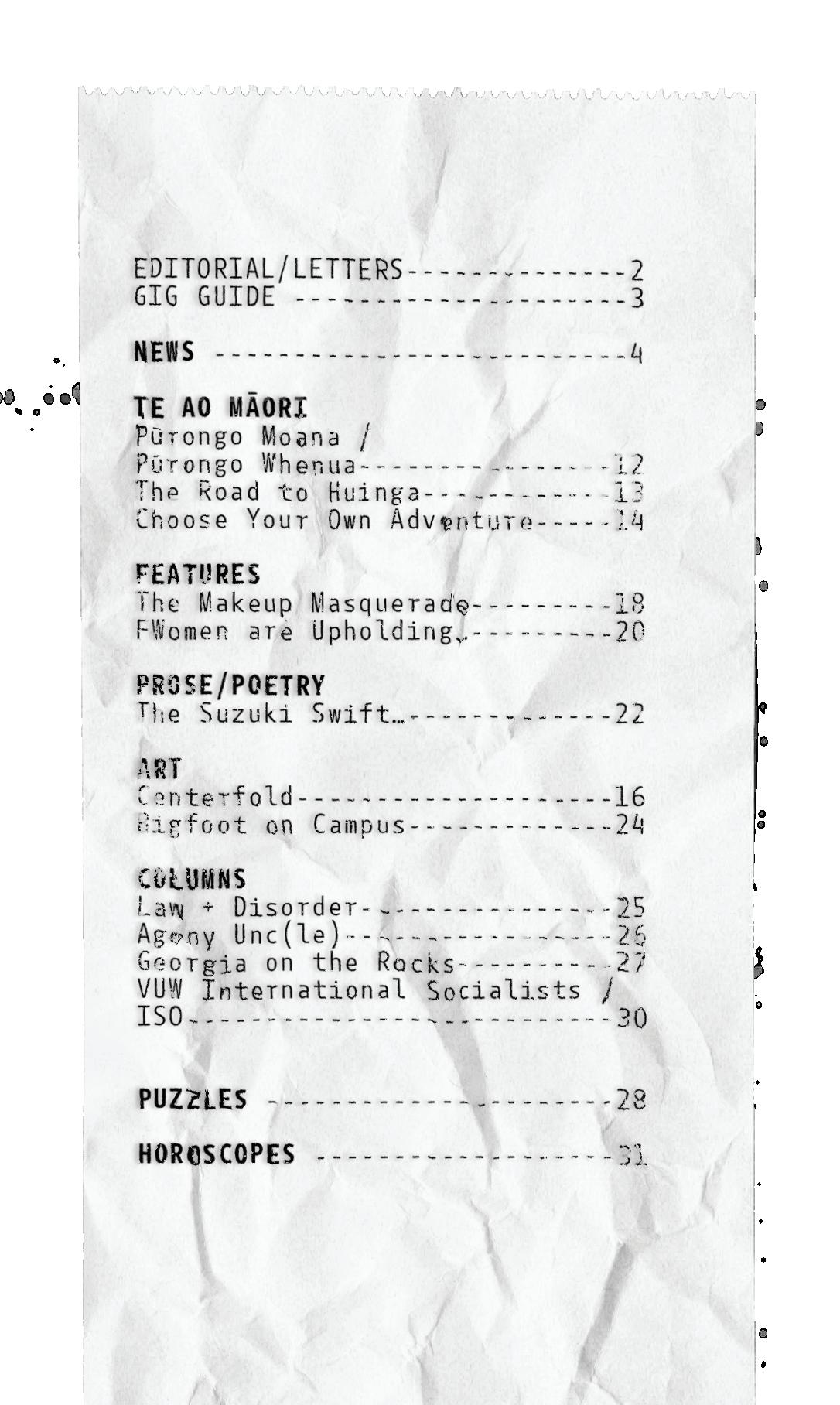
It's my fourth year at VUW (I'm postgrad now). In the first three years I happily thumbed through each issue of Salient, cheerfully filling in time that I should have been spending listening to the lecturer in front of me. The magazine always included something I didn't care for, or even hated altogether, but the good was enough to outweigh the negatives.
This year however, I have approached Salient with tentative apprehension. The ritual is the same each week; I'm at Kelburn on Thursdays, and from the moment I enter, I feel the magazine rack side eyeing me. I side-eye it back, guiltily. The tension is thick. I pick up a copy and it flops weakly in my hand, like a dead fish. I thumb through its pages (is it moist? from the tears of its previous, disappointed reader?). One, at most two, articles pique my interest (credit where credit is due, there are some amazing writers, both in your team and not), but the rest falls flat, as flat as the magazine does as I return it unceremoniously back to its rack for the next unwitting recipient. I don't know why I continued to fish, when my scaly catch was limp and lifeless every single time.
I haven't even saved the copy of Queerlient this year, as was my tradition during undergrad.
Issue 16 has turned the tide. Smaller but in a curated-minimalist way, not a deficient way. All pieces were enjoyable, but there were many that stood out in a most positive manner. The interview with Alex Baker was insightful. Te Aho Matua was a quality informative piece that I enjoyed greatly. As someone who took COMP102 and COMP103, I was already aware of Lena, but I find the piece to be highly appropriate for discussion in a student magazine, and it was done incredibly well. Marcail Parkinson's piece was personal and (unfortunately) relatable, and I appreciate their issues being brought to light, by their own hand. Sitting Ducks was a quality piece of creative writing and I gobbled up the vivid descriptions. Satisfying.
Yes, the latest issue of Salient has quenched my thirst for quality student magazine writing. For about seven days, anyways. I look forward to the next iteration. Kia kaha to your team, and ka rawe for what you have done already.

Time: Tuesday 7:30pm
Location: MOON Bar
Find fame on the stage at MOON or just watch the talent at their weekly jam night! Starts as an open-mic night, becomes a full on jam.
Time: Wednesday 8pm
Location: Fringe Bar
The race to the finals is heating up—come watch the action as Welly's rising comics perform their standup, with a pro comedian MCing the evening.
Time: Saturday-Sunday 7:30pm
Location: Circa Theatre
Opening weekend of a brilliant, uplifting one man show inspired by activist Te Wehi Ratana, jailed in 2023 for redacting elements of the Treaty of Waitangi exhibition at Te Papa.
Coven: An Evening for Queer Women and Gender Minorities (Koha)
Time: Saturday 8pm
Location: Ivy Bar
A safe, sapphic soiree for queer women and gender minorities! No TERFs, no SWERFs. This is a community event and safe space. Come have a dance <3
Make a Beaded Fish! Charm Craft Class
Time: Sunday 4pm
Location: Studio Seaweed
Seaweed is hosting a fun, easy-going evening of crafts this Sunday. RSVP on their site, bring your pals or make some new ones (the fish).
Time: Tuesday 2pm
Location: Hunter Lounge
learn about the dental for All campaign, share ideas and experiences, learn how to get involved and grab some merch and free kai!
Time: Friday 7pm
Location: Bedlam & Squalor
A blissful, transcendent night of original jazz performed by a large ensemble in the wonderful Bedlam & Squalor. This week’s composer is Jake Baxendale.
Time: Saturday 8pm
Location: Voglemorn Upstairs
The dream of the 90s is alive at Voglemorn—two warm, friendly and musically brilliant Pōneke indie acts are gracing the stage of our coziest venue for the most delightful double-bill you could ask for. Relax, and enjoy.
Swing Jazz Jam (Koha)
Time: Sunday 5:30pm
Location: The Undercurrent
Have you ever wanted to browse for a new read, drink in hand, eating mousetraps and watching swing jazz? Well you can this Sunday. Get amongst.
Sunday Jazz Club (FREE!)
Time: Sunday 3pm
Location: Parrotdog Lyall Bay
An absolutely excellent trio of Pōneke’s coolest jazz cats host a chill little jam every other Sunday. Check @parrotdogbar for deets.
EDITOR
Phoebe Robertson (Acting)
TE AO MĀORI EDITOR
Taipari Taua
NEWS EDITOR
dan Moskovitz
NEWS WRITER
darcy lawrey
MUSIC EDITOR
Jia Sharma
SUB-EDITOR
Henry Broadbent
COLUMN EDITOR
Georgia Wearing
DESIGNER
Cal Ma
JUNIOR DESIGNER
Nate Murray
FEATURE WRITER
Te Urukeiha Tuhua
SOCIAL MEDIA MANAGER
Teddy O’Neill
NEWS WRITER/POLITICAL CARTOONIST
Walter Zamalis
CONTRIBUTING WRITERS
Ryan Cleland
Saad Aamir
Guy van Egmond
CONTRIBUTING CARTOONIST
Jim Higgs
CROSSWORD CONTRIBUTORS
Julia Corston
Nil
CENTERFOLD
Phoebe Robertson
DISTRIBUTION
Saad Aamir
ADVERTISING SALES advertising@vuwsa.org.nz
READ ONLINE salient.org.nz issuu.com/salientmagazine
GET IN TOUCH editor@salient.org.nz Instagram/salientgram
Tweet/salientmagazine Facebook/Salient
LETTERS
Got something to say about the magazine? Want it published? editor@salient.org.nz
Salient is published by, but remains editorially independent from, the Victoria University of Wellington Students Association (VUWSA). Salient is funded in part by VUWSA through the Student Services Levy. Salient is a member of the Aotearoa Student Press Association (ASPA).
Complaints regarding the material published in Salient should first be brought to the VUWSA CEO in writing (ceo@vuwsa.org.nz). Ideally, by motorcycle. A letter can also be sent to the editor, for their response/publication in the magazine. If not satisfied with the response, complaints should be directed to the Media Council (info@mediacouncil.org.nz).
Submit


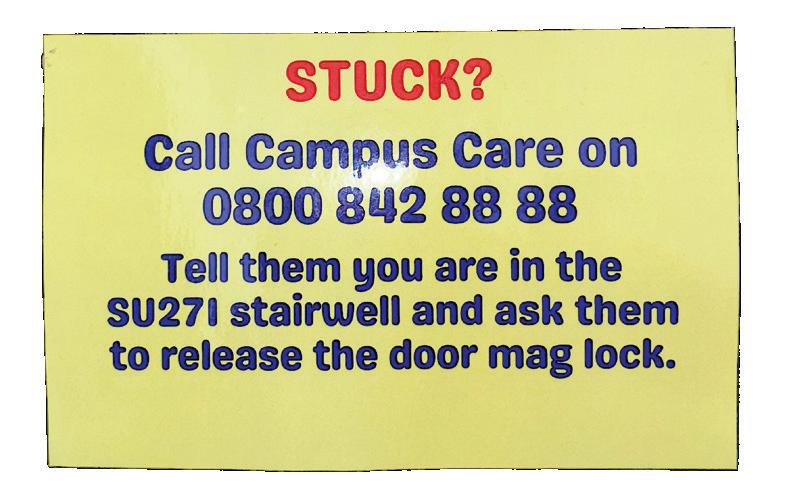
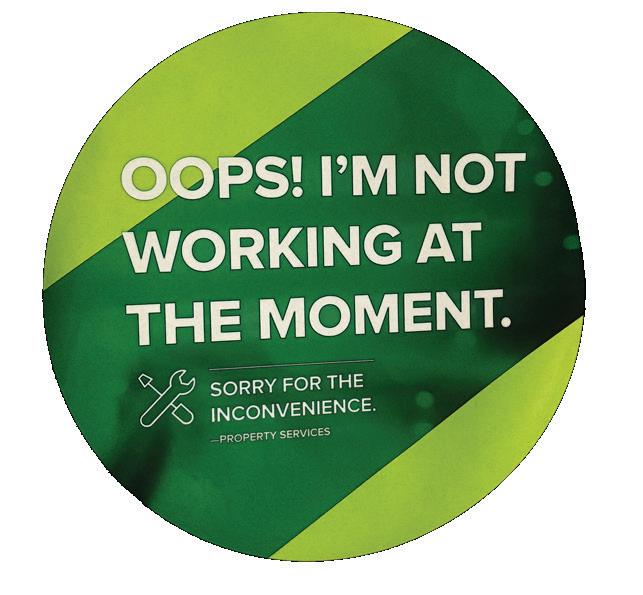
On the afternoon of Tuesday, 5 August 2025, a glass window pane detached from the Hunter Lounge and plunged to the ground below. No one was injured, but the incident—now hidden behind a sheet of plywood—feels representative of a larger truth: the Student Union Building is falling apart, and the university is letting it happen.
In a statement, the university said no students were nearby when the window broke, attributing the failure to thermal stress—an issue that can affect glass exposed to strong sunlight. Property Services, they added, are in the “early stages of planning” window replacements to ensure continued safety.


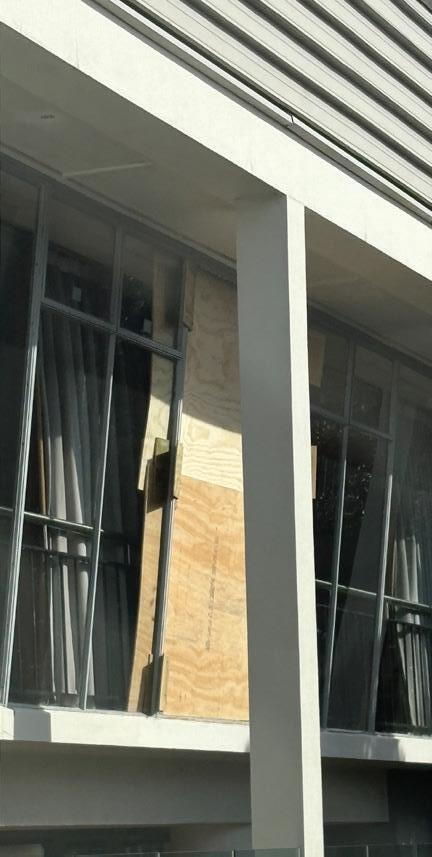
But with panes now ejecting themselves from the building, “early stages” feels like a generous interpretation. At this rate, the Student Union Building might just renovate itself, one shattered window at a time.
Step inside, and the evidence piles up. Ceiling tiles are missing in bathrooms. Cracked windows are held together with strips of tape. When it rains, water seeps through the ceiling outside the level four elevator. It would be easy to dismiss these issues as the quirks of an aging campus building. But this is not just an old building—it’s a neglected one, and students are footing the bill.
Although the Joint Student Union Board (JSUB) was established under a 2006 deed of Strategic Partnership to create a governance link between the Victoria University of Wellington Students’ Association (VUWSA) and the university, its role is purely advisory and holds no authority over the operations or maintenance of the Student Union Building.
In an interview with Salient, VUWSA’s Communication Manager Em Maguire said “this building is going full Final Destination on us all.”
While maintenance is generally managed by the university, the funding structure varies depending on where you are in the building, with different charges applied to different areas. What is clear, however, is that students have no direct control over how this money is spent—and that the Student Services Levy contributes at least a significant portion toward these costs.
Earlier in the year, previous Salient reporter Maya Field documented the state of the women’s bathroom opposite Mauri Ora: missing ceiling tiles, a vanished sink, a single working tap, and no hot water. The university confirmed the bathroom was on its maintenance schedule but noted it had not been prioritised due to “lower traffic.”
Nearby, another bathroom—SU151, located behind the Salient offices—had quietly transformed into a storage closet. It remained unlocked and disused, containing a beer box, an abandoned cardboard Christmas tree, and a high chair. When questioned, the university said the space was “not intended for public access” and that Property Services was working to “secure” it. A few days later, the door was locked. In its place: a sticker reading, “Oops I’m not working at the moment. Sorry for the inconvenience—Property Services.”
In stairwell SU271, a laminated sign warns that students who become locked inside should call Campus Care for release—a scenario the university insists is “extremely rare and not formally tracked.” But ask around, and it doesn’t sound so rare. VUWSA Receptionist Maia Moana told Salient that different Level 2 SU toilets have locked several students inside during her time as receptionist. On at least one occasion, she said, she had to kick the door down to get them out.
Meanwhile, Salient’s own office window has been cracked for years, patched with tape and labelled in a fading capital letters: “970x970 MIKES GLASS.”
There is a university system for logging repairs— BEIMS—but many students, and rep groups, are unaware of its existence or unable to access it. Maintenance does happen, eventually. But it is often reactive, delayed, and barely communicated. In many cases, the damage outlasts the students.
So the question stands: If students are paying for maintenance, why aren’t they seeing it?
Pro tip: Check out our centerfold this week for a view of the SU151 bathrooms.
dan Moskovitz (he/him)

For graduates seeking a foothold in local government, the outlook is grim. Neither Wellington City Council nor Greater Wellington Regional Council has offered graduate roles since 2023, casting a longer shadow over an already bleak job market.
data obtained under the l ocal g overnment Official Information and Meetings Act shows that Wellington City Council (WCC) ceased its graduate hiring program in 2023, after previously onboarding two to four graduates annually. When asked, a council spokesperson attributed the halt to shifting priorities within individual business units.
Greater Wellington Regional Council (GWRC), meanwhile, has never operated a graduate program, and declined to comment on why.
Aidan donoghue, VUwSA Engagement VicePresident, voiced frustration over the lack of opportunities. donohue, who leads VUwSA’s
'Where’s the Work' campaign, said he plans to press council candidates on the issue during debates ahead of October’s local elections.
The decline in graduate hiring reflects broader economic headwinds facing Wellington’s public sector. Although government agencies were instructed to trim budgets by 6.5 percent, graduate positions fell by 14 percent in 2024. Competition for remaining roles is fierce. The Ministry of Foreign Affairs and Trade received 1100 applicants for its early careers programme last year.
Locally, both councils are still offering fixed-term internships. GWRC advertised six internships in 2024, while WCC offered 15.
“An internship is better than nothing,” donoghue said, “but a graduate role is better than an internship. We want to see more opportunities for students to get their foot in the door.”
dan Moskovitz (he/him)
On August 1, VUWSA’s executive voted to officially join a new national student union. Moments later, they voted to join a second. Why?
The short answer: one body to foster dialogue and idea-sharing among student associations, and another to focus on campaigning and activism.
Ever since the New Zealand Union of Students’ Associations (NZUSA) succumbed to its thousandth cut last year, debate about the successor’s form has raged. Just three student unions remained when NZUSA folded.
Yet with all eight student union presidents rapidly convening to discuss a replacement, the perceived value of a national body endures. The challenge? Student politicians are opinionated, and no one could agree on which style the NZUSA’s successor should swing towards.
So—why not both?
Enter the Aotearoa Tertiary Students Association (ATSA) and the Aotearoa Tertiary Action Group (ATAG), both established this year to fill distinct roles. ATSA is for ideas; ATAG for campaigning.
Naturally, it was VUWSA Academic Vice President—and Salient alumni—Ethan Rogacion who proposed the dual-body model.
According to Rogacion, one advantage of this approach is that it allows non-political student associations, such as those at Canterbury and Lincoln, to participate in a national forum without violating their neutrality.
There are still teething issues. Neither body charges membership fees—a deliberate move to avoid the financial disputes that helped sink NZUSA.
Another question: what happens if a student association disagrees with an ATAG campaign? The group’s constitution has an “agree-todisagree” clause, requiring ATAG to make clear when an association opts out. But what that would look like, and its practicality, is unknown.
As of now, it’s unclear how many student associations will sign on to both bodies. The eight student executives are still voting, but Rogacion told Salient he’s hopeful.

“A
Rumors swirled through the capital two weeks ago following sightings of FBi director Kash Patel in the basement of the Beehive, and Finance Minister Nicola Willis’s remark about “lots of handsome men in suits who look like they have guns.” A contractor at the Intercontinental Hotel, speaking on condition of anonymity, told Salient that anti-bugging police teams had begun preparing the hotel for the visit 10 days prior.
But no bug was needed to uncover the reason for the influx of men in black: the FBI is officially setting up shop in Wellington. While the agency has long maintained a presence within the U.S. Embassy, Patel announced the establishment of a full legal attaché office (or “legat”)—an overseas outpost tasked with reporting directly to Washington.
Foreign Minister Winston Peters’ said kiwis “should be grateful” for the move, while Intelligence Services Minister Judith Collins described it as a step toward enhancing the “safety and security of all New Zealanders”.
The motivation behind the office’s establishment have sparked debate across media and online platforms. Marcin Betkier, a privacy law expert and lecturer at Victoria University of Wellington, told Salient he believes the office is intended for “coordination of transborder anti-crime activities between NZ and the US,” citing the growing threat posed by international cyber criminals.
But Valerie Morse, a leading member of Peace Action Wellington, remains unconvinced. She views the goal of curtailing international crime
as a pretext for anti-activist policing, stating: “the FBI has a very long history of investigating quote-unquote domestic terrorism, which we have to read as activism in this country.”
Morse also expressed concern for politically active students, pointing to the U.S response to pro-Palestinian protests at Columbia University. “What has happened there is terrifying,” she said.
According to Morse, the New Zealand Security Intelligence Service has previously pressed academics to report individuals whose research might be seen as compromising national security. With the FBI now involved “in the same kind of activity,” she warns that its presence in Wellington contributes to a “stifling atmosphere for freedom of expression and freedom of inquiry.”
Overall, Morse finds the entrenchment of a U.S. domestic police force in New Zealand “really worrying”. It’s a view she’s not alone in. The Aotearoa Workers Solidarity Movement called the office’s opening “a dangerous expansion of American imperial policing into the Pacific.”
In response to the announcement, Green Party spokesperson Teanau Tuiono renewed the Green’s call for New Zealand to leave the Five Eyes intelligence-sharing alliance, saying, “we shouldn’t be allowing foreign powers to set up shop like this”. Te Pāti Māori also condemned the move, arguing that it constitutes a breach of Te Tiriti o Waitangi
Te Urukeiha Tuhua (he/they/ia, Tūhoe)

Content Warning: Genocide, Crimes Against Humanity
All of us know what’s happening in Gaza. We see it every time we scroll on social media, coming across a video of a Palestinian person asking you to stop scrolling and support them and their family. do you sit with it and watch the whole video? Or do you hastily swipe down to the next video, uncomfortable as you are confronted once again with the ongoing horrors of this genocide? Have you allowed yourself to become desensitized to their pain?
There are thousands of families in Gaza who use social media as a tool for survival, reliant on donations to afford their basic necessities. I want to emphasize the importance of continuing to donate to those on the ground, but I also want to acknowledge how challenging it is when we want to donate and can’t afford to help them all. The magnitude of videos that we see can make us feel helpless to change anything.
Further, the juxtaposition of viewing a live-streamed genocide alongside memes, comedy skits, and general brainrot is making us numb. Becoming disconnected from the reality of what’s happening is dangerous, because it prevents us from feeling emotions that essentially make us human—empathy, grief, and rage—and stops us from channeling these feelings into action.
Feeling helpless or disconnected from reality points to an underlying illusion of powerlessness. If you truly couldn’t change anything, why not just accept it? Why even pay attention?
I want to illustrate the psychological warfare that is occurring. Your emotions while watching this genocide are not coincidental; we are experiencing a systemic attempt to break us down, to ensure that we feel incapable of making change. Allowing ourselves to spiral into depression ultimately results in inaction. Meanwhile the bombs continue to fall, and children are still starving. The people in Gaza pay for our immobility and silence with their lives.
So what are you doing about it? How do you respond when you hear them calling for help? We are not powerless. Each and every one of us are responsible for doing whatever we can to end this genocide and push for Palestinian liberation. We owe it to the people in Gaza, and we owe it to ourselves.
If you have been silent on Palestine for this long and are only now beginning to speak up, I welcome you. Be louder and more relentless in your fight to make up for lost time.
Have you ever thrown around the popular quote “there is no ethical consumption under capitalism”? While there is some truth to this, it doesn’t absolve you of responsibility. Personal decisions, including where we choose to shop, are political. There are various corporations which invest funds into the illegal occupation of Palestine, and as consumers, we need to prioritise boycotting these brands in our daily lives.
Is it acceptable to you that fast food chains like Mcdonalds provide free meals to ioF soldiers while they murder Palestinians every single day? do you think it’s okay that AirBnB is violating international law by continuing operations in Israel, supporting the continued displacement of Palestinians?
The Boycott, divest and Sanction movement outlines the brands you should avoid, and provides an explanation of why. You can download the No Thanks app on your phone to access a regularly updated, comprehensive list of boycotted brands. It also lists alternative brands you can buy from.
Boycotting Israeli products is the bare minimum that we can do to support Palestine, and it only costs us occasional inconvenience.
Last year Chlöe Swarbrick introduced the Unlawful Occupation of Palestine Sanctions bill, which would impose legislative measures against Israel and hold them accountable to international law. Scan the QR code below and find ways to support sanctions against Israel.
A bill must be supported by at least 61 members to pass through Parliament. Across the Greens, Te Pāti Māori, and labour, 55 members have expressed support. We need six more MPs to support this bill. Lobby your MP by emailing them and telling them that you would like them to support the Unlawful Occupation of Palestine Sanctions bill. If you’re not sure who your MP is, you can find out by using the electorate map on vote.nz.
It is their job to represent the issues that are important to us. Make your voice heard.
The importance of visibility cannot be understated. Keep talking about Palestine. Share posts online, flood your social media. Stay informed on what’s happening on the grund. Keeping Palestine at the forefront of everything applies pressure on politicians to act, and ensures that Gaza is not forgotten.
If you’re able to, get out in the streets and protest. Be loud and unapologetically visible. There are rallies for Palestine organised by @falastin_tea_collective every Saturday at 1pm (except for the first Saturday of every month), and larger protests and campaigns by @just4pal. All you need to do is show up—they often have placards and flags available.
Palestinians deserve to see us fighting on their side, and to know that we are with them. do not allow them to die, watching as you do nothing. They have called on us for help; we will not rest until Palestine is free.
Fergus Goodall Smith (he/him)
When I first started thinking about this piece of writing, my mind jumped to where it always does as a political nut, the United States. What the democrats need is their own Donald. Then I reigned myself in a little: what the left (in NZ) need is their own Donald. Then I realised that Trump is not capable of existing in the New Zealand political climate. There’s no point writing an opinion piece on something that just isn’t possible. A fresh RNZ-Reid Research poll showed that 44.4 percent of us think Trump 2.0 has been bad for Aotearoa. Just 8 percent think he’s done anything worthwhile. Someone who does survive in our Parliament: david Seymour.
For all of his flaws, his quirks, and his general arseholery, i don’t think it can be debated that david Seymour is one of the most brilliant politicians to ever grace the floor of the House. From a one-man army in 2015 to a phalanx of MPs under his command following the 2023 election, he’s done something right. He’s now the deputy PM, a largely ceremonial position, but not in Mr Seymour’s eyes. Talking to Guyon Espiner last week, he was quick to mention the likes of dick Cheyney as a second-in-command that wielded enormous power. Slightly concerning given Cheyney personally signed off on the CIA’s use of torture, and oversaw the deaths of over 200,000 civilians in Iraq all whilst enriching oil and gas company Haliburton, of which he was CEO.
With 8% of the vote, ACT with Seymour at the helm has leveraged a relatively small margin to enact massive change and societal upheaval. He’s shoved his agenda down the throats of nearly every New Zealander, first with the Treaty Principles Bill, and now with the Regulatory Standards Bill. He’s often spoken out against Luxon, and suffered no consequence because of it. Now he’s on the verge of controlling a new Regulatory Standards Board, of which only he can appoint its members.
david, to be frank, doesn’t really give a fuck if people hate his guts. He doesn’t care if he’s hugely overreaching, considering 92% of the country didn’t vote for him or his party. He’ll take every morsel of power and influence he can get, and he doesn’t shy away from it.
Compare this to the Greens time in power from 2017 to 2020, and two ministerial positions from 2020 to 2023. Can you remember anything they did? Yes, James Shaw was the minister for Climate. Yes, there was the Zero Carbon Act. But did we see a capital gains tax? A wealth tax? Are these not the central issues of the Green Party? For ACT, Treaty issues seem to be their top priority, and they’re definitely making headway with them.
I think a lot of people would look at the title of this article and immediately say “no they don’t, they’ve got Chlöe Swarbrick.” I’d rebut that point. Chöe is too likeable. She’s honest, and obviously capable, but she’s not a slimy git. That’s what the left needs. Someone who can rattle skulls and not apologise after doing so. Someone who will comb through legislation, and carefully construct bills using complex jargon that flies over most people’s heads. Someone who knows who likes them and who hates them, and is pretty content with watching those in the like category switch over to the hate category if it means furthering their agenda.
The left has adorned themselves with the mantle of moral superiority; they trip over it whenever they do something remotely close to the behaviour of this coalition government. Barbara Edmonds could be your favourite aunty, Chris Hipkins your by-the-book, goodie-two-shoes stepdad. That’s perfectly fine, but it doesn’t change much.
Okay, I can’t help it, but in parallel to the US, and in the words of Jon Stewart; “Republicans are playing chess, and the democrats are in the nurse’s office because they glued their balls to their thigh. Republicans exploit loopholes, democrats complain about the norms over and over and over, and it has ghastly consequences.” Just like Mr Seymour, the left needs to start exploiting the loopholes and language of legislation if they hope to keep up with this government’s accelerationist policy.
There are those still that dismiss Seymour. Those that hark back to his days on Dancing with the Stars. They think he’s some goofball, an odd looking fellow with a nasally voice and a quirky grin. Someone who’s fine with being the butt of the joke. In his words, he hates politics, he’s just an electrical engineer with strong conviction for liberal change. Wrong.
Seymour is the most dangerous person in that debating chamber. A cutthroat politician who has his own caucus pinned under his pinkie. He’s a man who won’t forget grudges, or the ministers that made him the butt of their jokes. He’s a slippery trout that even the likes of Espiner and Campbell can’t catch. A man I think even the Prime Minister is scared of, and who rivals Peters in his political tact. Where is that fight, that dirty chaotic Game of Thrones worminess? Where is that on the left bloc?
Yeah, maybe it means you’re a one term government, like this one might be, but does it not feel like more has been rammed through the House in the last two years than in the entirety of Ardern years, half of which had Labour with a super-majority? Or under Key’s rule for that matter? There’s a new, greasy playbook in use now, and it can’t just be david’s fingers leafing through the pages.
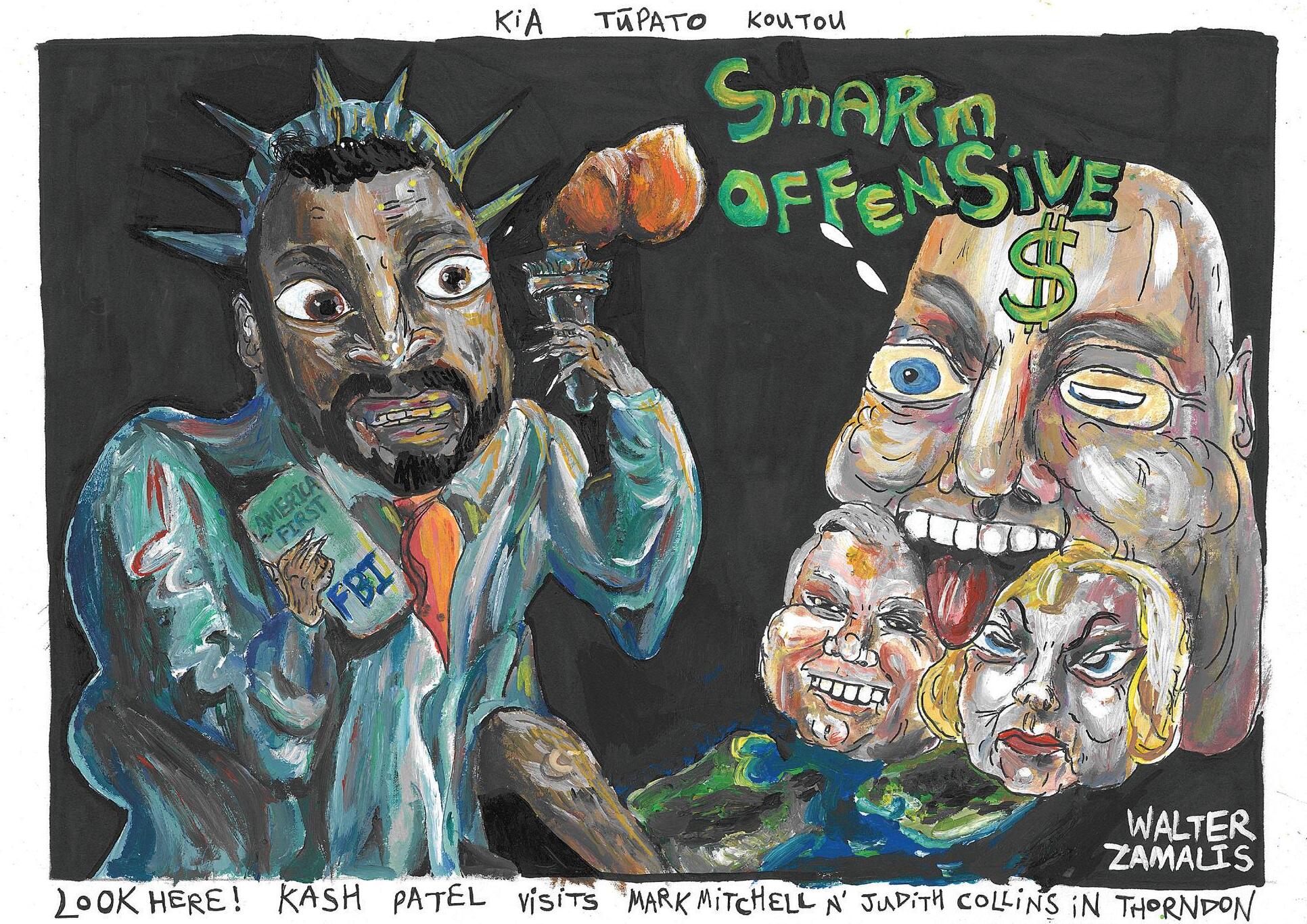

By Henry Broadbent (he/him)
Content Warning: Racism, xenophobia
As anti-migrant sentiment continues to grow across the UK, Starmer’s government has further legitimised a fear-based movement driven by increasingly emboldened, deeply racist “activists”. The latest episode in this sordid saga has seen Britain and France agree on a ‘one in, one out’ deal, whereby the UK can return would-be asylum seekers back across the Channel to France, in exchange for asylum seekers “who have a British link”.
This deal is predicated on the understanding that asylum claims made by anyone arriving in the UK by small boat will be considered inadmissible, automatically. This provision represents a further narrowing of avenues for asylum seen as ‘legitimate’ by the UK state, despite robust provisions in international human rights law asserting the right to asylum for people fleeing war and danger. Also directly contravened is the 1951 Refugee Convention—to which the UK is a signatory—which affirms the right of asylum seekers to choose their place of asylum.
The fact is, however much UK Labour bangs the drum in acquiescence to the populist Reform UK, nobody would risk their lives crossing the channel in a small boat, face potentially years of incarceration and
A newly released annual report by the Australian Institute of Marine Science’s (AIMS) has identified “the largest annual decline in coral cover in two of the three regions since AIMS began monitoring 39 years ago”, and has identified the climate crisis as the key driver. The report covers the period from August last year to this past May, and the data represents “the fifth mass bleaching on the Great Barrier Reef since 2016 and had the largest spatial footprint [ever] recorded.”
Professor Selina Stead, CEO of AIMS, stated that “the future of the world’s coral reefs relies on strong greenhouse gas emissions reduction” to stabilise global temperatures.
The report, released last Wednesday, arrives alongside a slew of climate news across the globe. Japan saw its hottest day since records began two weeks ago, with a high of 14.2C. The record lasted only six days before it was broken last Tuesday with a reading of 41.6C. This record was broken again less than 24 hours later with
legal limbo, and the further indignity of being shifted from state to state like a chess piece, were they not fleeing even worse danger. No human being should be forced to make a life-threatening journey like the Channel crossing for safety; people are backed into this position because of the UK’s steadfast refusal to establish safe, legal routes for asylum. The ‘problem’ exists because it has been created, and is a place of last resort.
These dehumanising policy decisions have a concrete impact on civic life across the UK, increasingly affecting not just refugees but people of color in general across Britain and Northern Ireland. Less than one month ago, in a disturbing illustration of the shift in ‘acceptable’ public discourse, a cheering crowd of British Loyalists in Northern Ireland burnt a towering effigy of a lifeboat with lifesize, dark-skinned mannequins in lifejackets aboard. Such displays are of course accompanied by strategic distancing from politicians, and carefully rehearsed ‘condemnations’; they are also downstream, undeniably, of the British state’s aggressive attitude toward refugees: a cynical electoral culture war courting Britons worst instincts— with zero regard for the human cost.
a new high of 41.8C, last Wednesday. That same day a deadly flash flood ripped through a mountain town in the northern Indian state of Uttarakhand; experts quickly identified the climate crisis as a factor in the growing number and severity of such events. More than 700 active wildfires in Canada prompted severe air quality alerts across Canada and the northern US as earlier in the week as, further south, land around the Grand Canyon continued to blaze—the largest single fire in the US.
This all has occurred against the backdrop of a historic ICJ ruling (read about it on page 25!) finding increased fossil fuel production could breach international human rights law, and rendering polluting states responsible for climate reparations. As oil and gas licences expand across Aotearoa, the impact of such industry becomes ever more apparent; now The Hague could throw the legality of such extraction into question.



The former Canadian Prime Minister Justin Trudeau was spotted dining with former popstar Katy Perry. Samantha Jin, who saw the pair, didn’t think it was a romantic date—“no visual signs of PdA or anything”— but you have to wonder what the two would even talk about.
Perhaps Trudeau is hoping to enlist Perry in Canada’s new federal body investigating recent UFO sightings. There might not have been any clear PdA at le Violen, but there were certainly Fireworks—Trudeau was later spotted singing along, knowing all the words. It’s the little things that count.
The showrunner of Sex and the City’s reboot series had announced that the third season will be the show's last. And with it dies unforgivably chunky jewelry, terrible non-binary and queer representation, and adult relationships more complicated than your long-term, long-distance, low-commitment, casual situationship.
The ending is bittersweet. A show that could have cemented the idea that 50s are the new 40s, 40s the new 30s, and so on, fell short on its promises and became a ‘hate-watch’ for fans.
At least the original show will always remain timeless— and a must watch once in your twenties and again in your thirties.
A new addition to Kim Kardashian's shapewear line, Ultimate face is a jaw-sculpting face wrap designed to “snatch” you overnight. Unsurprisingly, it hasn’t become a viral sensation—missing the peak of “morning shed routines” and featuring the kind of light choking only tight, synthetic fabric can provide.
This isn’t a new concept. Face wraps have been around for a while and are generally understood to make little difference to how your face looks or how fat is distributed. And I have a very strong suspicion that the only “celebrities” that have—or ever will—wear this are the models on the website.
The Subway dropped July 31st and was accompanied with large-scale promotion across New York, including a long lock of urban Rapunzel hair and posters playfully complaining about it. Chappell Roan mourns a break up and the girl who “got away,” while also announcing a run of U.S. pop-up shows.
In the Instagram announcement, she introduced a new ticketing system aimed at reducing scalpers and bots. But some fans are understandably hesitant to enter their credit card details before even seeing ticket prices. The system includes an instant charge to verify that the buyer is a real person—but it’s not without hiccups. Several fans have reported their cards being frozen, not by Chappell’s team, but by their banks, which flagged the unfamiliar transaction as potentially fraudulent.
In lieu of new age verification laws in the UK—requiring users to verify their age by submitting photos of a physical id or their face—some users have found a creative workaround: Norman Reedus.
The Walking Dead actor’s face model, featured in the video game Death Stranding, includes a photo mode that lets players zoom in and interact with his digital likeness. Users have discovered they can respond to prompts like “open your mouth” or “wink” using Reedus’s in-game face, tricking the verification software.
Now, all across the UK, Norman’s clones are clicking through NSFW subreddits, accessing X, and hopping into discord servers. while this loophole will likely be patched in future updates, for now, it’s worth wondering whether Norman Reedus is aware of the freedom—and folly—his face is granting to UK web users.

Māori and Pasifika News
By Taipari Taua
(Muriwhenua, Ngāpuhi)
i tērā wiki i whakatū ētahi pānui e the rōpu kaikiri a Hobson’s Pledge, ā, ko ēnei pānui e whakahē ana i ngā wāri Māori. Kua tū ēnei pānui ki rotorua, Kirikiriroa, whangārei, Ōtautahi, me Te whanganui-a-Tara. Ko tētahi tohu e whakaaria ana he wāhine Māori mau moko kauae, koia ko Ellen Tāmati nō Te Arawa me Mataatua. inā tōna ohorere, tōna pōuri i a ia i oho i ngā hāora o te rūrū me te rongo kua whakamahia e Hobson’s Pledge i tōna kanohi kia whakanui i tētahi kaupapa e kore rawa e whakaaetia e Ellen. E ai ki tētahi uiui me Aukaha News, he wahine kaha ia ki te tautoko i ngā kaupapa Māori katoa.
Ko tā Hobson’s Pledge, i kua wātea kē rātou kia whakamahia tērā whakaahua hei tā te ture i te mea kua hokona e rātou te “mana” kia whakamahia te pikitia mai i ngā whakaahua stock. Hoinānō, ko te mea kē ko te ture o te whakaahua rā kia kaua rātou e whakamahi i tērā whakaahua mā ngā kaupapa arumoni me ērā momo pānui. i mea mai a Hobson’s Pledge kua tono atu rātou ki te kamupene e whakaatu ana i tērā whakaahua kia kāti.
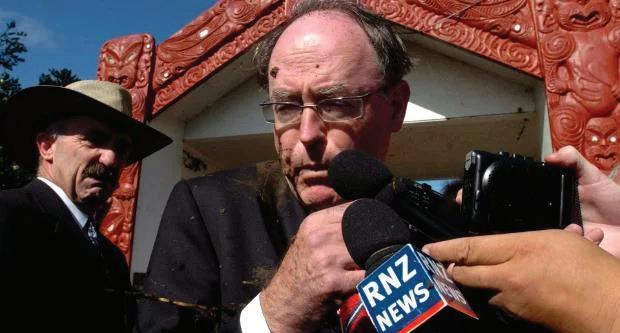
Ellen Tāmati, of Te Arawa and Mataatua descent, woke up last Wednesday morning to find that her image had been unknowingly and nonconsensually used in an ad by the infamously racist Hobson’s Pledge lobby group, led by former MP and leader of the National Party don Brash. The ad, part of the Hobson’s Pledge anti-Māori wards campaign, depicted the moko kauae wearing Ellen next to text saying "My mana doesn't need a mandate — vote no to Māori wards," implying that thise were Ellen's personal views. Ellen and her whānau were outraged, hurt, and angry as they are staunch supporters of Māori wards and “all things Māori.” in a heartbreaking interview with Aukaha News, Ellen stated that this experience was “bloody traumatising." She also urged viewers to vote for Māori wards.
In a statement from the Hobson’s Pledge Facebook page, they said that they have contacted the billboard company and asked them to take the image down, and that the stock image was legally purchased and that they had secured the right to use it in materials facing the public. However, according to an article in Te Ao Māori news, the licence they used to buy the image was not for commercial purposes, it was for editorial use only. The photo taken this year at Waitangi by Israeli rafael Ben-Ari, who was an idF photographer, and Ellen had no idea that it was going to be put on iStock.
In other unrelated news, we are pleased to report that there are piles of mud to throw everywhere for those with eyes to see.
Taku Manawa by Kahu Waitoa when this song comes on, i’m from Ngāti Porou for 4 minutes and 22 seconds. Tū MAi r Ā HiKUr ANgi ��
Mō moni, mō raru - More money, more problems


Ngāti Pāhauwera, Ngāti Porou.
For many student associations, preparing for a national conference is no small feat. It’s more than booking accommodation and transport, it’s about planning that goes into it months in advance, the fundraising, coordinating the team that will be taken to the event, making sure the right people supported are about to effectively represent their rōpū. in Te wiki o Te reo Māori, Ngāi Tauira will be taking this journey as they begin their preparations for Te Huinga Tauira, the annual National Māori Students’ Conference.
organised each year by Te Mana Akongā (TMA)—the National Māori Students’ Association, they bring together tertiary students from across the motu. As described on the TMA website, THH is:
“The annual National Māori Students’ Conference where tertiary students gather to discuss and debate topical issues, participate in cultural and sporting activities, and raise awareness about some of the issues that impact on Māori students at tertiary institutions, and within the wider community. Te Huinga Tauira is also an opportunity for Māori students to nurture and maintain their cultural identity, access social and support networks outside of their institutions, and participate in activities that enhance, and add value to, their experiences within the context of their learning.”
In order to organise the event, Hui Kaiarahi tuarua took place, the second hui in which most—if not all—executive members from each student association meet to discuss planning and more. This year Hui Kaiarahi tuarua was hosted by Te Tira Ahu Pae in Papaioea. After a full weekend of discussion and deliberation, it was confirmed that Te Huinga Tauira will be hosted by Te Waiora at Waikato University. With a location rich in history, the timing of the conference also means that those attending will get the chance to participate in Kīngitanga day celebrations, adding another unique opportunity to the kaupapa.
Aria Ngarimu, co-tūmuaki of Ngāi Tauira, shared her excitement for the trip, noting the significance of this year’s conference after last year’s absence:
“With NT not going to Huinga last year, this will be an exciting opportunity for those who were unable to attend previous Huinga. I’m looking forward to the student development and the opportunities for future pathways for all tauira.”
Aria also highlighted the importance of celebrating Kīngitanga day with Te waiora and tauira from across the country. She acknowledged that while the Kīngitanga may not be formally recognised by some iwi, it offers a valuable chance to learn about its history and significance.
Matagi Vitolio, Ngāi Tauira’s Āpiha Hauora, emphasised the human side of the journey, building relationships not only within Te Herenga Waka but also with other universities:
“It’s about connecting, building trust, and working together through challenges, games, and shared mahi. I want to make sure everyone’s wellbeing is looked after, that they’re keeping up with their studies, and that even those who aren’t selected to go still feel part of our kaupapa.”
Matagi also stressed the need to break down cliques and cycles of exclusion, creating a more inclusive culture within Ngāi Tauira. For him, the trip is not only about representation but also about recognising the responsibility and service that comes with being part of a rōpū Māori.
Ruby Stuart, Ngāi Tauira’s administrator, shared her anticipation for the social and learning aspects:
“I’m excited for the social aspect of it, meeting people, taking part in the different workshops, kaupapa, and wānanga. i think it’ll be an awesome opportunity to create bonds.”
At the same time, Ruby acknowledged the practical side of organising such a trip:
“I’m definitely a bit worried about the expenses and making sure everything we’ve booked is correct. It’s a lot to manage, but it’ll be worth it.”
Kaea Hudson, co-tūmuaki, perhaps captured the excitement best:
“I’m most excited for the group we’re taking, for a lot of them, it’s their first time going. This year’s TMA and the other rōpū are such a cool bunch!”
For Kaea, the novelty and fresh energy of the group will make this year’s Huinga a memorable one.
As the journey to Huinga continues, Ngāi Tauira’s focus is clear: to represent Te Herenga waka with pride, to nurture relationships across the motu, and to ensure that the kaupapa of whanaungatanga, inclusivity, and service remain at the heart of everything they do. Te Huinga Tauira is more than a conference, it’s a celebration of identity, connection, and collective responsibility. For Ngāi Tauira, the road ahead is not just about getting to Waikato, but about the growth, bonds, and shared memories they will carry with them long after the hui ends.


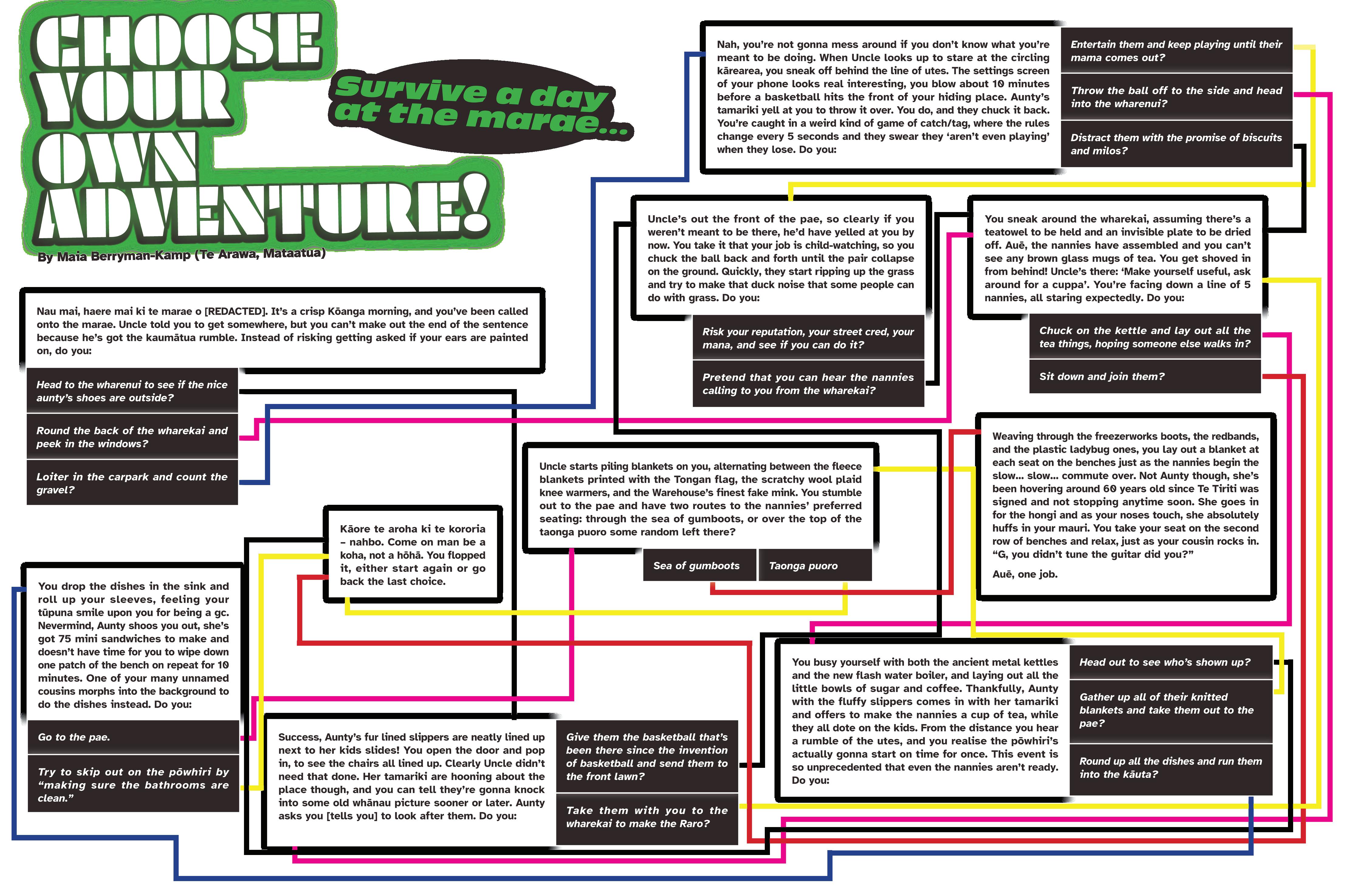



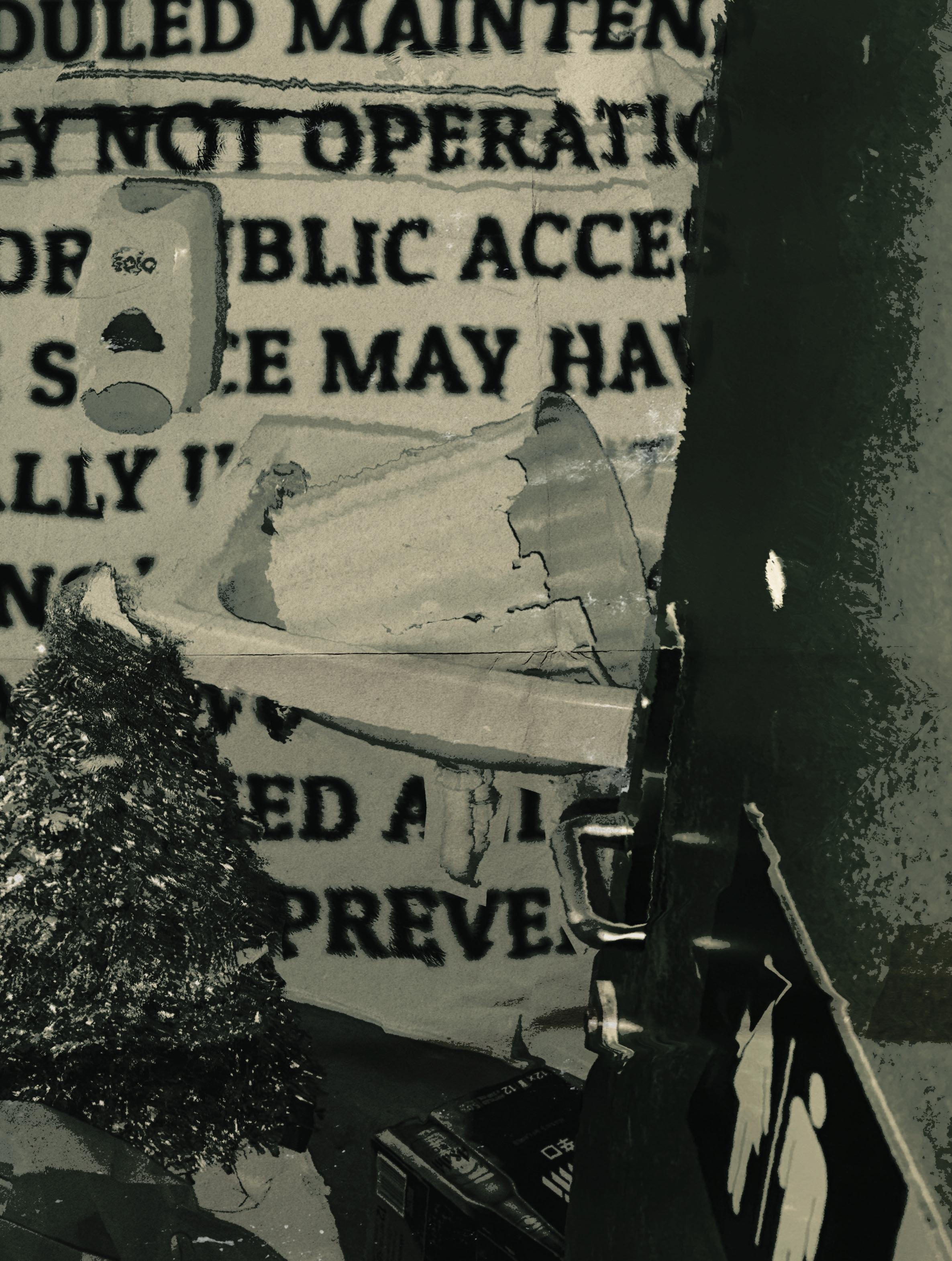
Throughout my arts degree, I’ve become well acquainted with theories surrounding the performance and construction of gender. Judith Butler’s famous theory—that gender is learnt, constructed and performed—has been cited in lecture theatres since my first year. But it wasn’t until recently that I truly grasped how these concepts manifest beyond the academic sphere. Last trimester, in a cinema and representation film paper, i encountered Mary Ann doane’s theory of the masquerade of femininity. doane posits femininity is a mask—constructed and worn by women on screen. Recognising this mask allows viewers to distinguish and create distance between themselves and the femininity portrayed, revealing its artificiality.


In a world of ever-shifting beauty standards, denaturalising manufactured femininity is crucial. While the ideals may seem obvious, doane’s framework urges us to consider how these ideals are upheld. Makeup, in particular, serves as a powerful tool in constructing the mask.
It’s curious that femininity’s construction is still dismissed, even as we’re surrounded by evidence of it. On social media, “morning shed” and “glow-up” content lay bare the steps required to achieve a curated image. Before these trends, films leaned heavily on the “ugly duckling” transformation trope—Pretty Woman, The Princess Diaries , and The Devil Wears Prada— each showcasing the labour behind becoming the ideal woman. To claim that femininity is natural is to say that none of this action is required to achieve it.
We perform femininity in ways so embedded they often go unnoticed. In the 1950s, it was the cinched waist and red lipstick of post-war domesticity. In the 1990s, it was the “heroin chic” look—waifish bodies and smudged eyeliner. Today, it’s contouring tutorials, lash
extensions, and the curated “clean girl” aesthetic. Each era has its own tells, its own mask, shaped by cultural forces and media. These performances are not just about beauty—they signal belonging, aspiration, and compliance with the dominant narrative of what it means to be feminine.
This is where the mask becomes visible. When we understand the boundary between real and constructed, we can identify the performance. But when these lines become blurred, certain kinds of femininity are naturalised. “No-makeup” makeup routines exemplify this: they aim to conceal the very act of construction, promoting the illusion of effortless beauty.
Subcultures like goth and punk, where makeup is overt and unapologetic, often face criticism precisely because their masks are visible. The backlash reveals a discomfort with transparency. If the construction is obvious, it fails to meet femininity’s covert expectations. This is also why makeup is often dismissed as frivolous—despite its common practice, the act itself is meant to be invisible.
The pressure to perform femininity intersects with Laura Mulvey’s theory of the male gaze. In 1975, Mulvey argued that women in cinema are framed as objects of visual pleasure for men. But the gaze is not singular—it’s tripartite: the male audience, the male character and the camera all participate in this act of looking.
Our society mirrors this cinematic structure. In the earlier examples of constructed femininity, we see the rewards it offers—respect, popularity, career advancement. These incentives fuel the performance. However, it’s interesting that this messaging is so prominent in media targeted at women: rom-coms, coming-of-age stories, and social media influencers all reinforce this mask. These narratives teach us how to perform femininity to meet patriarchal standards.
Of course, you can choose not to perform. You can deny the expectations of gender performance, as many people do, or subvert them, like the alternative subcultures. There is power in not performing, in throwing away the mask and de-naturalising femininity. But opting out often comes with consequences.
For gender-diverse people and more masculinepresenting women, the stakes of not performing femininity can be even higher. The absence of the mask doesn’t just invite critique—it can provoke exclusion, misgendering, or even violence. When femininity is treated as a default expectation, those who fall outside its boundaries are often seen as failing to participate in a social contract they never agreed to. The mask, while restrictive, can also serve as a shield. Choosing not to wear it means facing a world that often punishes difference.
I’ve long taken pride in not performing. I didn’t grow up around makeup—my mum doesn’t wear it, and I’m grateful. Yet, lacking the skill to construct the mask can be intimidating. As a cis white woman, I hold privilege, but I’m still a young person in a world full of outrageous standards. Without a mask, any performance of femininity is wholly mine. Critiques land directly—not on a façade, but on me.
There’s undeniable power in the ritual of the mask. Getting ready with friends, sharing tips and tools—there’s a sense of connection that comes with it. But would such rituals exist without the expectation to perform? Can a bonding experience rooted in patriarchal desire truly be empowering?
I once believed that dismantling femininity meant abstaining entirely. But recently, I’ve found myself drawn to the masquerade. I now recognise the mask—what enables it, how it influences my views of femininity, and how I treat others who fall outside its bounds.
It’s neither healthy nor fair to expect everyone to discard their masks. In a patriarchal world, makeup can offer respect, support, safety and acceptance. For those who reject the masquerade, it can be a medium of creative expression and cultural alignment. I encourage everyone to unpick the roots of their mask. What do you use it for? Who taught you to wear it? How do you perceive others who perform differently?
Everyone is performing a form of femininity— consciously or not. But awareness is power. Understanding that makeup is a tool for this performance is the first step in acknowledging the masquerade.
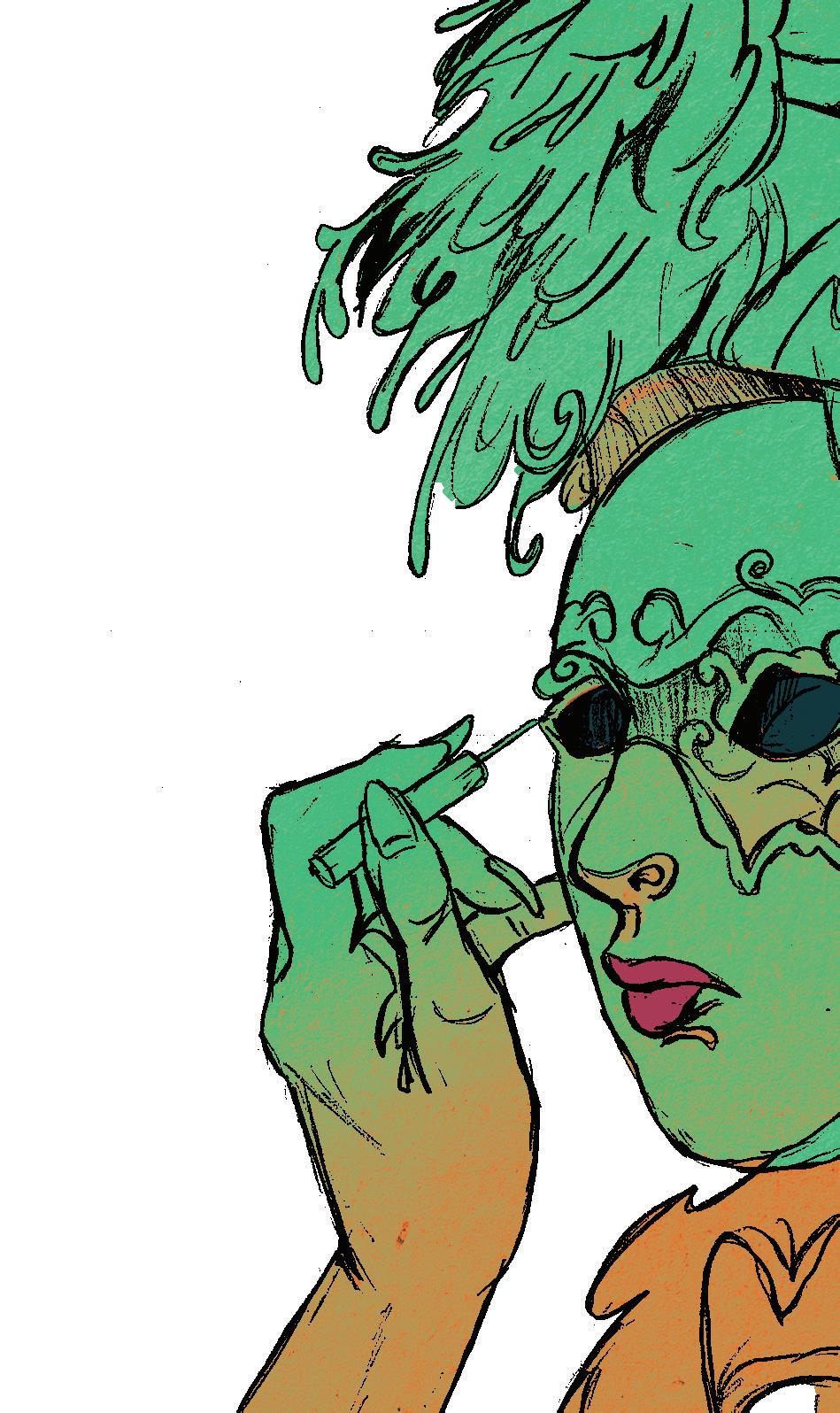



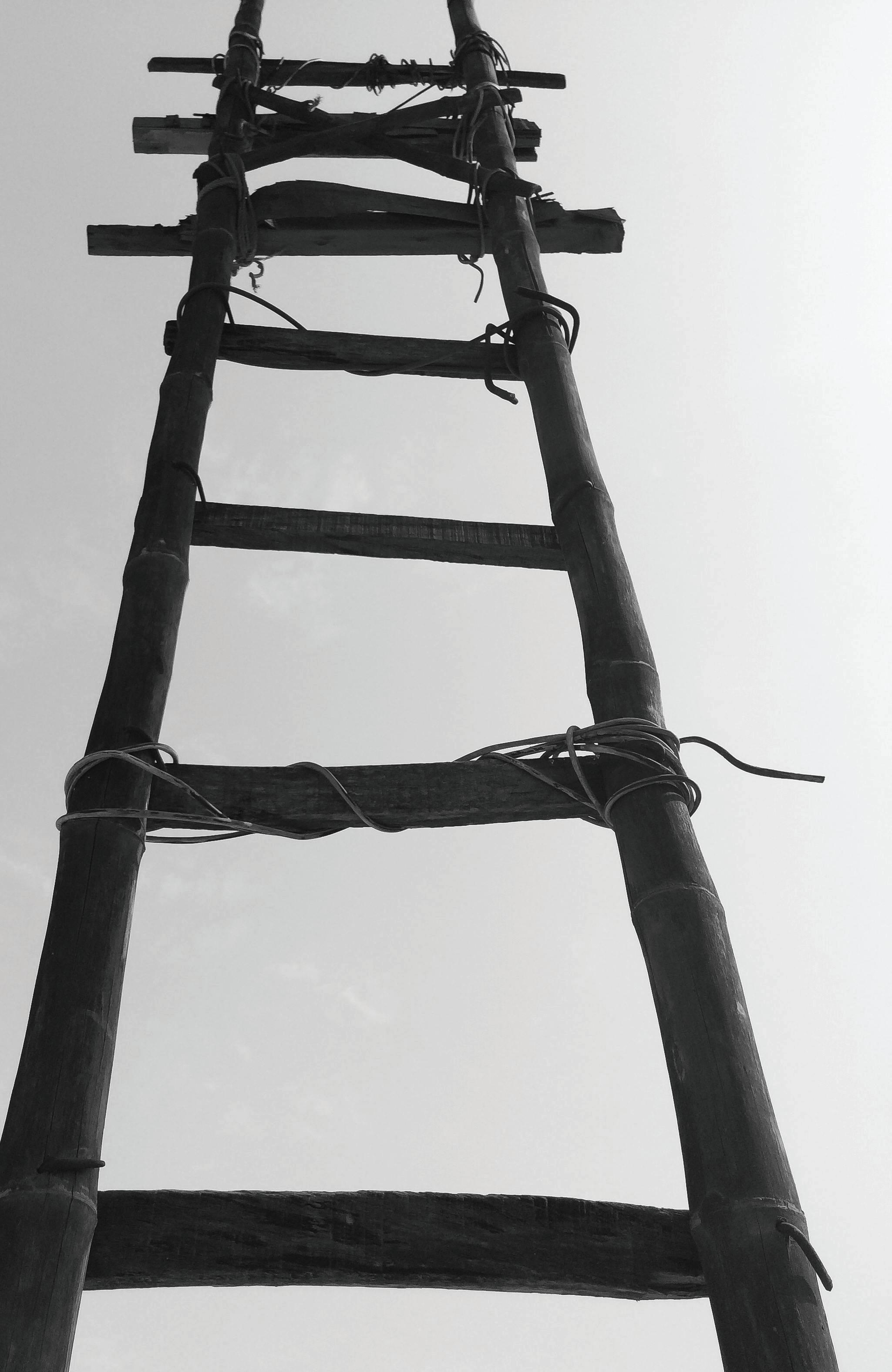
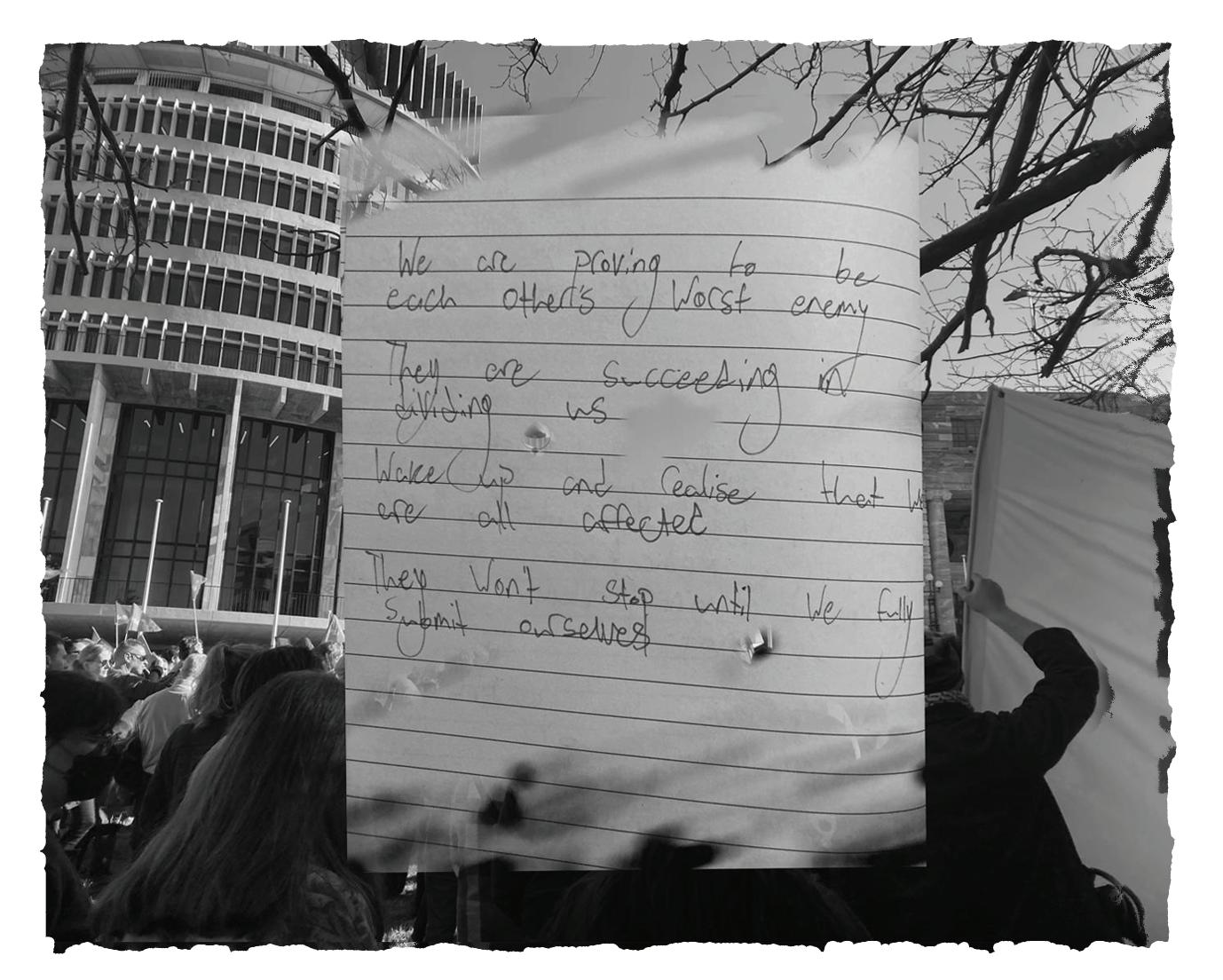

demanding pay equity. As I stood among the crowd—men, women, trans and non-binary individuals—I couldn’t ignore a troubling absence. Where were the white Gen Z women such as myself? Where were the girls that
I saw grandmothers, mothers, aunties of diverse backgrounds and ethnicities, but there was a glaring lack of university-aged white women. It’s a frustrating era of feminism to inhabit. Online, youth-led social justice movements are loud, but white women my age remain particularly quiet—both materially and
Feminism today is fragmented, splintered into competing ideals. In some cases, it’s turned inward, manifesting itself as bigotry—most noticeably in the rise of trans-exclusionary feminism (TERFism). Perhaps this was inevitable, given that modern feminism was built on the mobility of white women.
There are conflicting phenomenons at work currently. We are seeing a major political divide between men and women in terms

Our right to move freely through society as women is precarious, swaying with the political winds.
of the societal binary enforced. Women are leaning left-wing, and men are heading right. But conservatism is surfacing among women in subtler, more insidious ways. It feels suffocating. I don’t want to hear another lick from the “clean girls” with their sticky bangs and aesthetics that they totally invented themselves (false). I’m exhausted by Instagram reels featuring women failed by the medical system who now channel their anger into conspiracy theories and bigotry.
To my fellow white women: turning to hatred doesn’t lessen our oppression. It may offer a fleeting sense of power, but at what cost? Who could have predicted that the 21st-century reincarnation of authoritarianism would be a blonde lesbian who worships Margaret Thatcher?
I think of white women in the US who overwhelmingly voted for Trump. Their daughters who now parade the “trad-wife” lifestyle on TikTok. Maybe they’re too far down the rabbithole to listen to any counterargument. Or perhaps it’s an excuse for me to not engage in hard conversations.
Turning back to the protest, I’m reminded why we’re here: because of the actions of white women in government. Minister Brooke van Velden stripped thousands of workers— mostly in female dominated roles—of pay equity. It feels not just wrong, but like a betrayal. But perhaps we were naïve not to see this coming. Trans, Black, Māori and brown women have long warned us about the dangers of white women wielding unchecked power. Maybe we didn’t take action because we thought it wouldn’t affect us.
I look around and see elderly women who have fought these battles before. They look tired. How cruel to put these women through this ritual over and over again. And I wonder: who will take up the mantle when they’re gone? Because it is
not a question of if—it’s when. Our right to move freely through society as women is precarious, swaying with the political winds.
Afghanistan once offered women opportunity, education, and autonomy—much like Aotearoa does today. It continues to shock me how many people don’t know this, which speaks to just how effectively the Taliban have reshaped the country’s sociopolitical landscape. Now, Afghan women can’t speak publicly without the fear of punishment. What we’re gained can be repealed—anywhere, at any time.
This realisation presents a choice: to uphold or rebel. Increasingly, it seems many women are overwhelmingly choosing to uphold the status quo—perhaps out of self-preservation, or perhaps for power.
I think of J.K Rowling, who champions the TERF movement. Her rhetoric, cloaked in concern for “men” entering women’s spaces, has gained her influence at the expense of trans women. Earlier this year, the U.K Supreme Court ruled that the legal definition of a woman was that of a biological female, reinforcing a rigid and oppressive gender binary. Rowling celebrated by posting a photo of herself smoking a cigar on her yacht. Celebrating the further oppression of a marginalized group doesn’t seem like an up-to-date goal of feminism.
A few weeks ago, I had a conversation with my mother about how frustrating it is seeing powerful women in these supervillain roles. She said “For some, equality means becoming the oppressor.” How damning, I thought to myself. It’s haunted me ever since.
I want to call myself a feminist. I want to identify with the history that has granted me the social mobility I possess today. But I refuse to align myself with women who have used feminism to climb the ladder—only to pull it up behind them.
‘For some, equality means becoming the oppressor.’

Before I begin, let me offer a quick disclaimer: I’m deeply grateful to live a life that allows me to travel. This is not a lament about privilege… however… when you find yourself aboard the Suzuki Swifts of the air, it’s not unlikely to be left with a few battle scars, plus the moral obligation to warn others of the horrors that lie in the skies above them. To put this ominous disclaimer into context, around three weeks ago, I boarded a 12-hour Jetstar flight, unaware of the terror I would soon endure. I tell you, reader, it was bloody harrowing.
Where do I even begin? Let’s start with what happened roughly one hour into my flight. I was staring into the abyss, already questioning plenty of life choices, when I was interrupted by an ununiformed, unidentified figure, standing above me, glaring with unnerving intensity.
I assumed he was lost or possibly in distress, so I began with a simple: ‘You right mate?’ No reply. What followed was an excruciatingly slow reach into his front pocket (fearing the worst, I assumed he was summoning a glock) and he produced a mince and cheese pie, thrusting it into my lap. I stared at the meal as if it were a ticking bomb, waiting for it to explode. The mysterious man continued on his way, and that’s when I awoke to the realisation that this gentleman was, apparently, a crew member. Jetstar, it seems, doesn’t require uniforms as they soar across the globe. Either that, or it was a mufti day for the staff.
Moments after this slightly unnerving encounter, my eye was attracted to the cockpit door, which was wide open. Not slightly ajar, completely fucking open. At first, I thought what you, as the reader, may be thinking, “Possibly the pilot was dropping a load and forgot to close the door?” Very reasonable assumption. However, forty-five minutes passed, and I concluded that the captain, who was piloting 300 passengers
over the Philippine Sea, soaring through a torrential rainstorm, shaking hands with the devil, was entirely open for a Q&A from the passengers. Interesting tactic of customer support, considering the only question I had was ‘how the fuck do I get off this plane?’. Allow me to inform you that I practically sold my soul to get onto this flight; I was blessed to have a first-person view of the pilot’s experience. I know I sound like an arrogant twat, so I should compliment the fact that the lovely, ununiformed staff placed me in the emergency seating, which, considering my height, was greatly appreciated. I could properly relax and enjoy international travel… however… I was ignorant of the fact that being placed in emergency seating involved a complementary crash course in airline safety protocol. Yes, on Jetstar, they like to teach you their entire fucking job, in case you weren’t already loving their services. Had an emergency occurred, I was solely responsible for aiding every poor passenger off that tin can with wings.
God-forbid an emergency did occur, I would’ve been put out of my misery faster. One can only hope for a miracle.
In-flight entertainment? Forget it. I doubt first class even received that luxury option. Why would you give 300 people the ability to relax when they can just stare at the greasy scalp of the passenger in front of them? There I was thinking I would be able to watch a newly released film and hopefully black out from boredom, instead I realised why anti-dandruff shampoo was invented, because the cock sitting in front of me hadn’t heard of showering before. It was like staring at the head of a mechanic who had been working for twenty years. ‘Greasy McGee’, I’ll call him, and if by some miracle, he reads this piece, please shower, I’m begging you.

Then came the layover four hours in Rockhampton City, Australia. Let me write that again for impact. We had a four-hour layover in Rockhampton City fucking Australia. Transitlounge? Why would you invent one of those? Instead, 300 of us were informed by staff—who deserve medals—that we would be spending the four-hour layover on the literal airstrip. I swear on my life, I’m not exaggerating or joking. So that’s how I found myself, using my luggage as a seat, sharing a cigarette with a man I’d met about 20 minutes ago, waiting for our plane to literally land right in front of us. What a predicament.
during the first hour, i was empathetic. Patriotic, some would say. ‘I can’t believe they would let these hard-working Kiwi citizens, who paid an arm and a leg to board this flight, sit outside on an airstrip for hours’, I thought stoically. And then I’m not sure what happened, but three hours in, my morals completely transformed and I began thinking ‘these fucking guys deserve it’. Somehow I went from patriotically supporting the passengers to hating them and myself with immense passion. I apologise to you readers for my arrogance, Jetstar brought the absolute worst out of me.
I’m aware of how I sound. Spoiled. Arrogant. Slightly schizophrenic. But I’m only offering this piece as a cautionary tale, not to use this as a platform to bitch about my life. Next time you’re scrolling through flight options and you excitedly notice some suspiciously cheap fares, please pause and consider whether you’re prepared to endure what I have described today. Think about spending 12 hours with the ability to sit shotgun with the pilot. Consider whether you want to have a smoke on an airstrip, which I’m pretty sure is illegal. If so, by all means, book it! I commend your bravery. But if I’ve done my job, you’ll opt for the slightly pricer seat significantly smoother ride.


excuse me, can you help me Find my lectures?
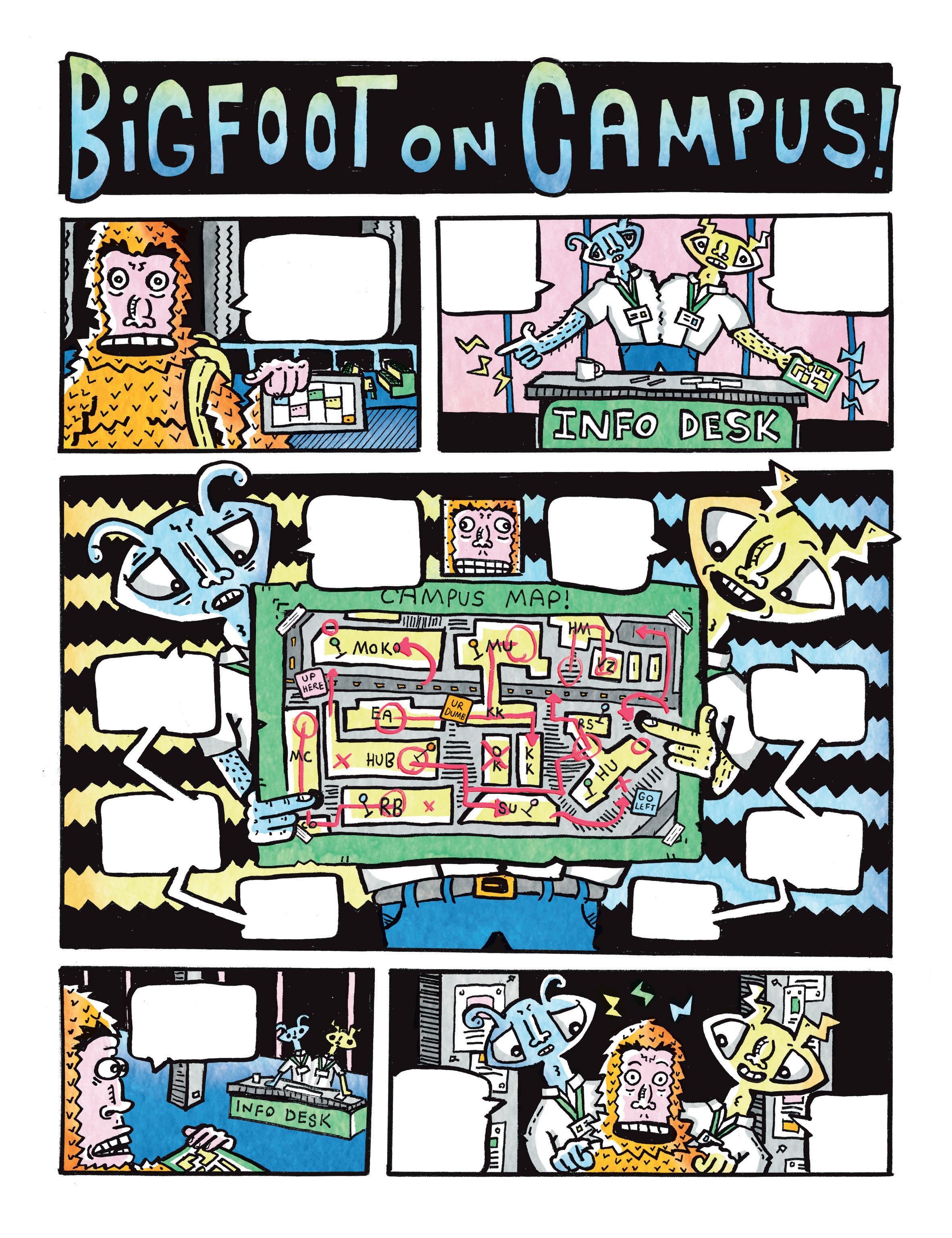
to get to von zedlitz, you must go through hugh mackenzie, oF course.
Follow the smell oF subway to Find the hub entrance.
we can point you in the right direction...
it’s really quite simple iF you look at the campus map! make sense? you got it? the loungehunter is not in the building!hunter
this map looks Flat but you have to start thinking vertically.
there’s new kirk and old kirk, and don’t Forget about new new kirk. is there anywhere i can park my car?
robert stout building is taller than it seems.,, sell your car and buy a snapper card... you will love walking up that hill!
What happens when a group of law students decide to take on the world's worst polluters? They trigger the most significant climate ruling in international legal history. The International Court of Justice (ICJ) has recently delivered an advisory opinion that's about to make every fossil fuel executive lose sleep.
First, let's get you up to speed. The ICJ is basically the United Nation's supreme court: a bench of referees, deciding disputes between countries. An advisory opinion is like getting the best legal minds to weigh in on a massive question. Even though their answer isn't technically legally binding, it carries immense persuasive power, especially when the ruling is unanimous.
A group of student activists, the Pacific Island Students Fighting Climate Change (PISFCC), started the ball rolling in 2019. Their campaign urged the ICJ to produce an advisory opinion answering two critical questions: What legal obligations do countries have regarding climate change, and what happens when they ignore those obligations?
While we can't dive into every detail of the ICJ’s 500 page opinion, here's the general vibe: states, and companies within them, must act to prevent foreseeable climate harm or face international legal responsibility. Countries that screw up face a long list of consequences: they must stop the harmful behavior, promise not to repeat it, provide reparations, offer restitution, pay compensation, and provide satisfaction to affected parties.

The Court made it crystal clear that climate obligations aren't just about treaties like the Paris Agreement. Remember how Trump withdrew from the Paris Agreement as soon as he got in office? This ruling essentially says, "Nice try, but customary international law still has you on the hook”. The court declared that customary international law imposes binding obligations on states to take preventive and precautionary measures to avoid climate harm, including regulating private companies. Essentially, you can't just tear up a treaty and walk away from your climate responsibilities.
What's more, the ICJ dropped some serious truth bombs about emissions. While pumping out greenhouse gases isn't automatically illegal, failing to take appropriate measures to prevent foreseeable harm absolutely is. This includes everything from fossil fuel production and consumption, to handing out new exploration licenses, providing subsidies, or having inadequate regulations. Every country that produces coal, oil, and gas has been officially put on notice, and that includes Aotearoa.
While advisory opinions lack binding force, this ruling carries extraordinary legal weight and political legitimacy. It provides climate lawyers worldwide with authoritative ammunition for domestic cases, establishing international legal principles that courts will recognise. Every government authorising fossil fuel expansion, every corporation seeking new licenses, and every piece of climate litigation now operates within this international framework. What began as student initiative has become legal doctrine that major polluters cannot ignore.
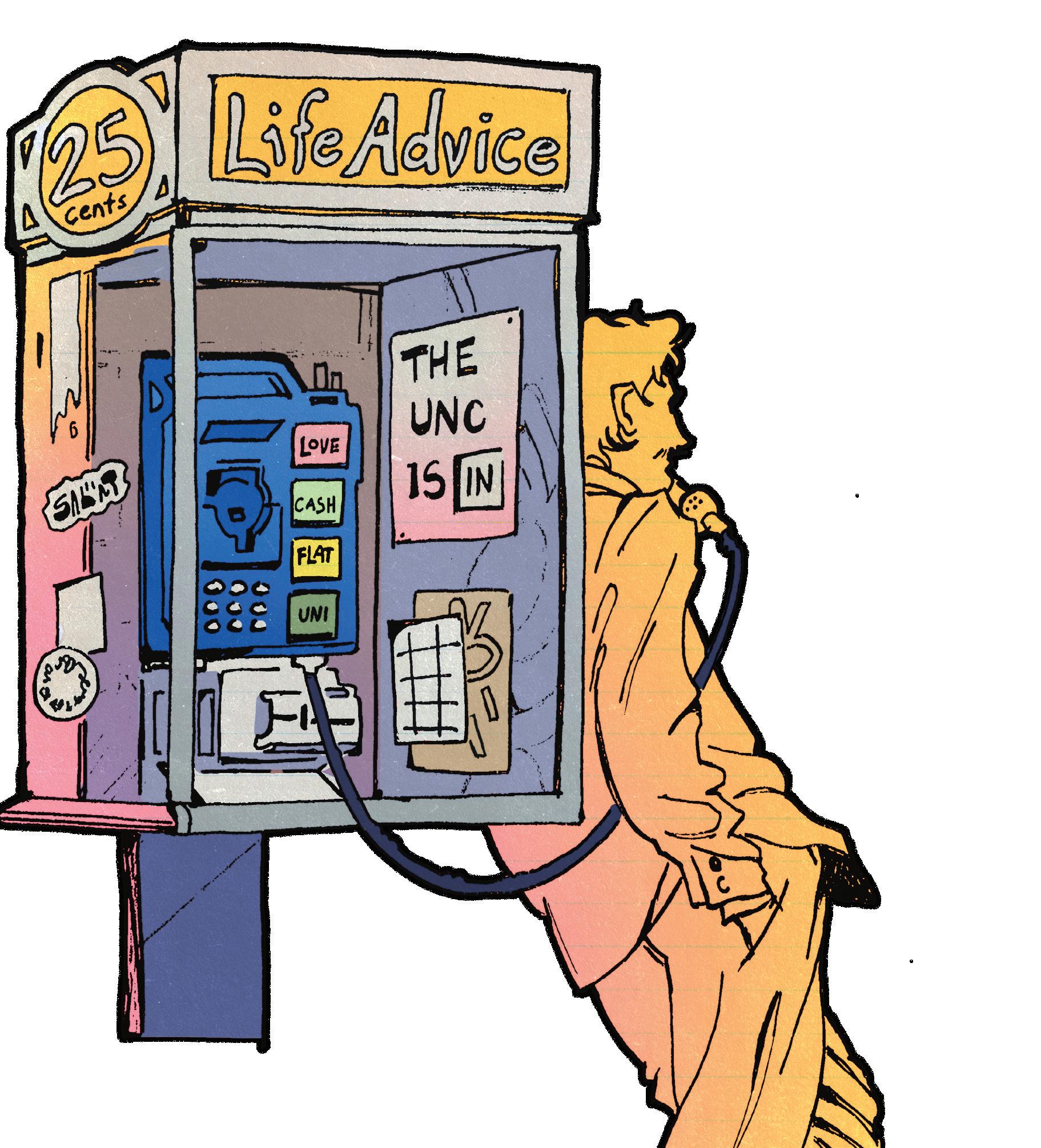
Ah, the classic Wellington dilemma: choosing between comfort and honesty, loyalty and sanity, renewing the lease or finally living somewhere that doesn’t smell faintly of toast and unspoken resentment.
Let me guess—you moved in with three of your mates thinking, This will be great! We’ll have dinners! Movie nights! Emotional maturity! And to be fair, it hasn’t been awful. Nobody set the oven on fire. No one’s stolen your food. It’s just... fine. Fine in the way a room-temperature V can be considered “a beverage.”
But now you’ve met some new people. Flatmates who wipe benches without a passive-aggressive group chat reminder. People who have matching mugs. Souls who don’t believe “roster optional” is a legitimate lifestyle choice.
And now you’re in the thick of it: lease limbo. Your current flatmates are buzzing about staying on. You’re buzzing about not. But saying “hey, I love you guys, but i’d rather risk Vicdeals roulette with strangers” feels like announcing a breakup over a group dinner. You’re terrified of seeming ungrateful. Or worse—disloyal.
Here’s the thing: student flats are not marriages. They’re not even long-term relationships. They are shared domestic experiments where the goal is

My flatmates want to renew the lease, but I’d rather live with new people next year. How do I tell them without breaking friendships?
to survive a year without going full feral. You are allowed—encouraged, even—to move on if your needs, energy, or tolerance for soggy tea towels have changed.
The key here is timing and tone. Tell them early don’t wait until they’ve printed out the lease renewal and baked you a commemorative lasagna. Sit them down. Be honest, kind, and neutral: “Hey, I’ve loved living with you, but I’m thinking of changing things up next year. I’ve got a good vibe with some other people, and I want to see how that goes.”
No drama. No comparisons. No “you guys never clean the toilet” unless you’re asked , in which case—choose your battles.
Will they be disappointed? Maybe. But if your friendship hinges entirely on continuing to split a power bill, it probably wasn’t that strong to begin with. Good friends get it. Great friends help you move into the new flat, even if it’s up a vertical Mount Vic staircase.
Yours, Agony Unc(le)
Ready for the next bout of existential dread? Agony Unc(le)’s inbox is always open. Bonus points if it involves romance, rent, or whether a $14 flat white is a crime.






Every page of The Library's drink menu is worth browsing—the small bites, signature two-for-one cocktails, and even the mocktails. I chose the PreMadonna: elderflower cordial, lemon, spiced honey, and peach lemonade, served in a tall champagne flute. It was muddled, sweet, sticky and refreshing, with enough depth to actually taste like a well-made cocktail.
Mocktails in cocktail bars are always at risk of being expensive glasses of soda water, but each of The Library's highlights is exciting—not just nojitos or established cocktails with the alcohol removed.
Another night, I’ll go on a real bender and drink
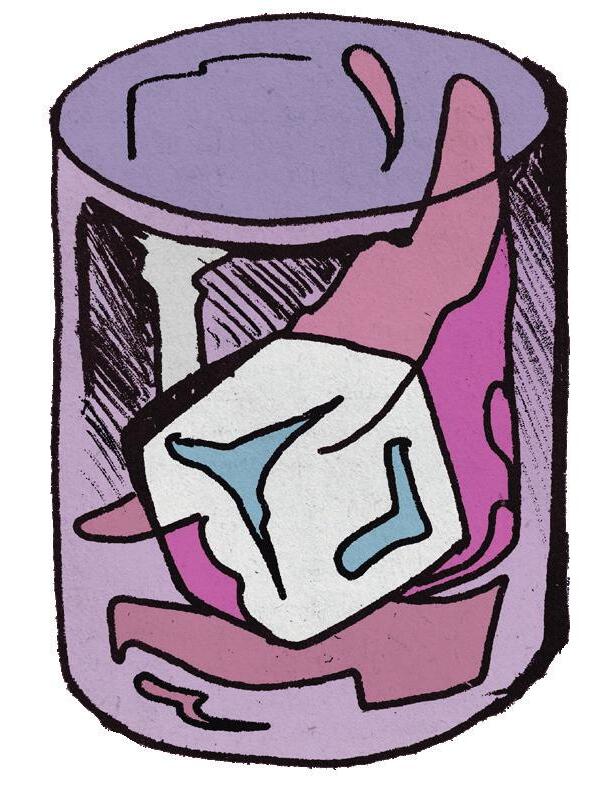
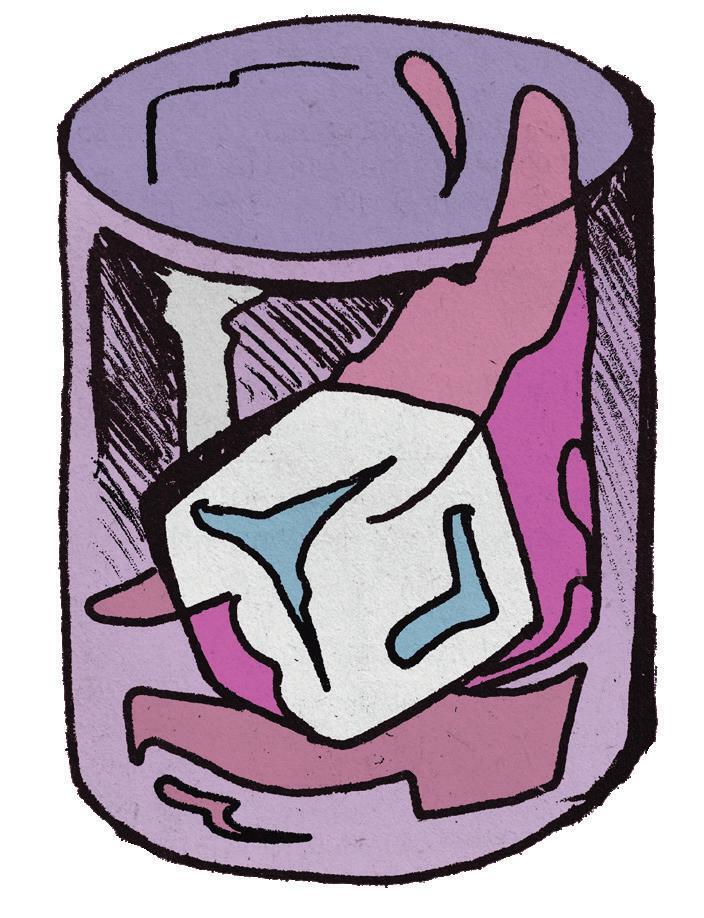
It’s no secret that Wellington's night life scene seems to be on a bit of a sabbatical. Business owners are frustrated that they aren’t making enough, liquor licenses are restrictive, and young people are opting for house parties over town because it’s too expensive, too dangerous and… too boring.
So you’d expect a night-life staple to be safe? Get Rick Rolled, Mish Mosh has been rebranded as Rick Rolls. It’s now another cocktail bar with wicker light fixtures, jungle theming (Lulu’s is literally across the road), and bougie bites like flat bread and warmed mixed nuts. Another student bar closes and is gentrified for the middle-aged crowd.
Mish Mosh wasn’t perfect—it was grungy, the basement was a cesspit of groping, and the music was a looping playlist of the same ten songs. But it was part of Courtney Place culture, a fixture you could judge the night by, based on the line outside.
According to rumour, the owner was unaware of the Rick Rolling meme and chose the name because it “rolled off the tongue” which is… an opinion. The revamp looks boring. I’m never going to say at pre’s: “Let’s Rick Roll!” and, in my opinion, it’s a clear example of how Wellington bar owners and businesses have outdated ideas of what good nightlife actually looks like.
I don’t know where the wandering packs of students will be grazing this weekend—but I doubt it’s at Rick Rolls.
1 Cheap places to stay when tramping (4,7,4)
8 *Groups of people working together (5)
11 How a stoic person may deal with their problems (7,2)
12 *Vocal range of an awful singer (3,4)
16 “It smells like _____ in here” “what’s _____?” (2,3)
18 * Indicate strongly (5,5)
20 *To bring up an argument in a debate (5,5)
21 Goes will with video (5)
22 *One’s point of view (7)
25 What Adele did to the rain (3,4,2)
29 *do well in (5)
31 An array of learning tools, mentioned in the starred clues (9,6)
1 How one must win in volleyball (2,3)
2 Spy org. (1,1,1)
3 Opposite of trans (3)
4 Vegetarian alternative (4)
5 Opposite of nah (4)
6 Japanese noodle (4)
7 Person who receives the blame (5,4)
9 Opposite of max (3)
10 Slayed, in slang (3)
13 Cullen of Twilight fame (6)
14 Mistkaes in writign (5)
15 Chinese greeting (5)
17 Triangular snack (6)
18 K on the periodic table (9)
19 Brexit target (3,1,1)
22 Roblox injury sound effect (3)
23 Light measurement
24 Jenner whose sibling saved the world with the help of Pepsi (5)
26 Soft powder (4)
27 ____ jure; by the law itself (4)
28 Italian Assassin’s Creed protagonist (4)
29 Sprite that (probably) wouldn’t be nice to drink (3)
30 Your student loan living costs can be tied to this (1,1,1)

By Julia Corston













A Column by VUW International Socialists / ISO
As promised, the Government is putting more cops on the streets. Green MP Tamatha Paul caught flack in March for arguing that this would make many people feel less safe. Paul’s opponents have countered with polls suggesting that large numbers of people feel safer with beat cops around. This debate is telling us something we already know: cops make some people feel more safe and others feel less safe. This is not an uncomfortable aspect of the conversation; it is the whole point. Beyond helping politicians score cheap political points, policing serves to protect the interests of the rich and middle classes, at the expense of poor workers and the oppressed.

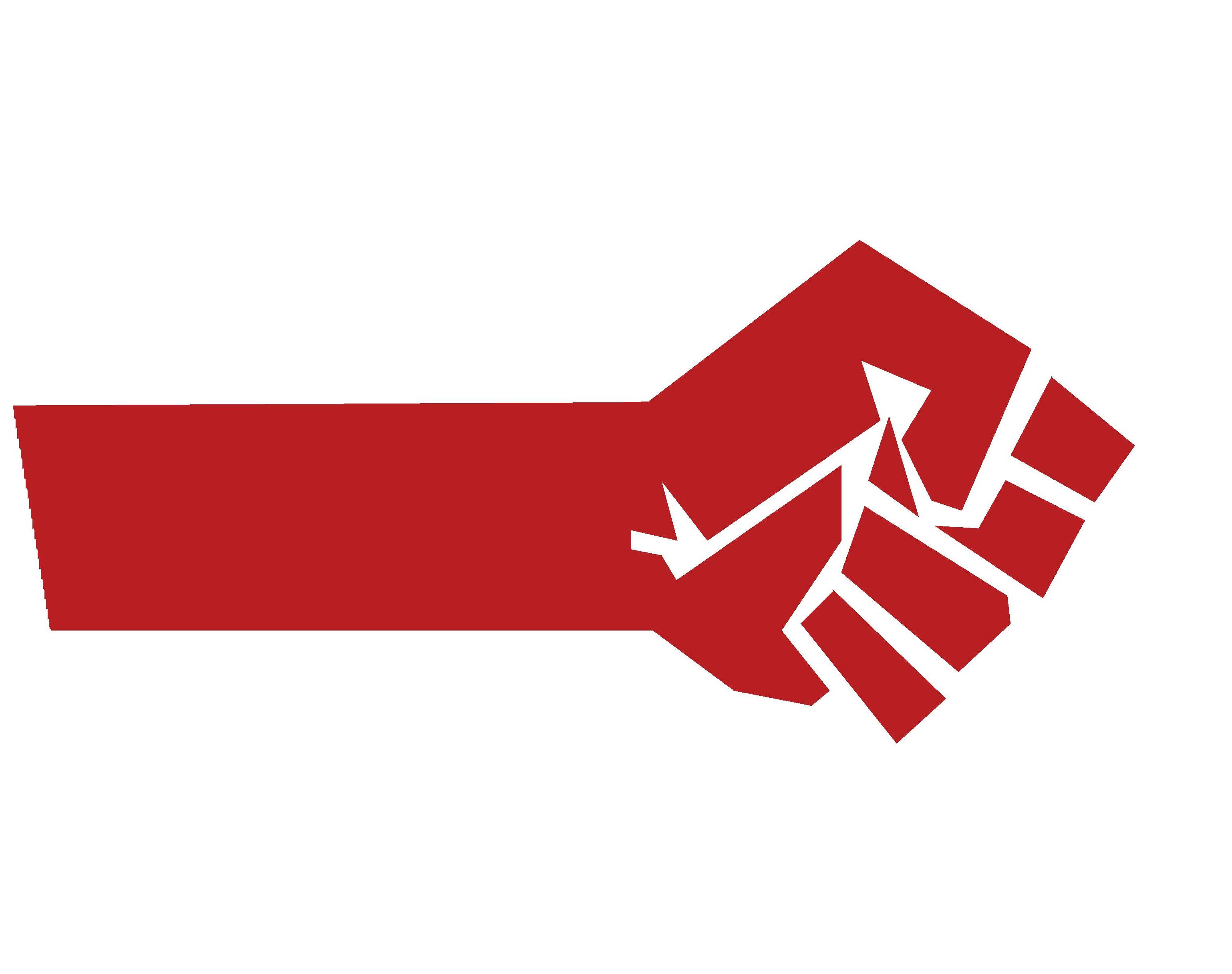
For those who feel menaced by cops, the threat isn’t imaginary. Take one example: the Human Rights Commission has recently raised concerns about the deliberate use of pain to subdue arrestees. Māori made up 48 percent of people on the receiving end of these “pain compliance techniques”. In August last year the Understanding Police delivery report—like many reports before it—found bias and structural racism in policing. Among the findings: being Māori increased the likelihood of prosecution by 11 percent, and Māori men were more likely to be stopped, and to be tasered.
Other oppressed groups also have a fraught relationship with the police. In a recent survey by Backbone Collective, women and trans people who were victims of intimate violence, family violence, or sexual violence reported that police involvement made them feel less safe. Among the negative impacts was the overt homophobia and transphobia that multiple LGBTQ people reported experiencing from police.
Reporting on beat policing reflects class bias, focusing on business owners’ concerns about retail crime and “antisocial behaviour” impacting
business. These complaints then become synonymous with public safety as a whole. One source of anxiety is visible symptoms of social decay: poverty, homelessness, addiction, untreated mental illness. Policing does nothing to address these issues at the root; it only keeps the people experiencing them in line, or disappears them into prisons. It is no accident that today, the government is increasing police presence at the same time that they cut social spending, including health, and axe initiatives aimed at addressing inequality.
This has impacts beyond the people immediately targeted. Policing the “bottom” of society sends a wider message: watch out, or you’ll end up like them. In this regard, it is less about safety and more about social control—and protecting property. If cops make you feel safe, you should ask yourself “at whose expense?” You should also ask yourself, “for how long?” Almost every significant social movement in our history has faced police repression. At any protest or strike today, a lineup of cops will be present. This is because their role is not only to protect property, but also to protect the entire colonial, capitalist system.
Just take a look at this history and origins of policing in New Zealand. From 1846, a colony-wide Armed Police Force, modelled on the paramilitary policing used in ireland, was implemented to put down Māori resistance. In 1867, the Armed Constabulary was established to occupy and police regions where land had been stolen in the Land Wars. These bodies evolved into the modern police force in 1877. The police continue to play a role in reinforcing the theft of Māori land, most recently arresting peaceful land protectors at rotokākahi.
If we want a safer city, we should be fighting for fewer cops and more social spending. And if we want to change the world, we need to recognise that the cops will never be on our side.

This week's centerfold was made by love by our editor-in-dictator Phoebe Robertson. When we asked the university about the neglected bathrooms, their response was:
“SU151 is on our scheduled maintenance plan. It is currently not operational and not intended for public access. It also appears the space may have also been unofficially used as storage due to the door being unlocked. Property Services are working to get this space securely locked and appropriately signed to prevent further misuse.”

Keep playing the game of chicken of dishes in your flat. Don’t be the one to let up and do them. You deserve to be headstrong, Monarch. (Gender neutral.)
You have been putting this off for a while, so what I need you to do is walk into town and go to Pegasus books. While there, close your eyes, spin in a circle, and point at something. As long as it’s not the man that works there, take it home.
The time of not being able to buy iced coffee is almost over. I promise Libra, money is coming. You just have to nurture it. Type YES to affirm.
You remember how you’ve been ignoring the black mould in your flat? Probably time to call tenancy services and issue a fourteen day notice to repair. Snitching is good if it’s against landlords.
They also declined to comment on another question; “Does the university hate Salient? Is that why you've given us a haunted bathroom in our stairwell?”
So, in ode to our haunted bathroom which has now been locked, we decided to immortalise it, and their response, in our centerfold. As a team, we will be framing this image and putting it up in our flat bathrooms, and we dutifully request that you, dear reader, do the same.
It’s time to redownload Tinder. You have outgrown your situationships, it’s time for something new. Resubscribe to Neon, and watch Game of Thrones with your dates.
It’s time to move to Otago. Critic is better than Salient anyway. Go burn a couch. Go listen to DnB. Have fun with your $100 a week rent. Life could be a dream.
DO NOT FALL FOR THOSE SCAM TEXTS. YOU DO NOT OWE ANY TOLL MONEY. YOU DON’T EVEN HAVE A CAR.
It’s time to make a choice. You're not Bella, you’re leading people on. Pick the one with the biggest bank balance, (or the sparkly vampire.)
This weekend is going hard. Get all your mates and go to town. Or, a BYO. You’re still young, go out twice! Use your course related costs; they won’t audit you.
Your situationship is cheating on you with your flatmate. If not physically, then metaphorically. It’s time to hibernate and start over in Summer. I’m sorry, Virgo.
Have you considered therapy, babe?
You can’t pour from an empty cup, especially one full of resentment. Give less this week. Hoard your snacks. Ignore emotional leeches. Protect your energy like Jojo Siwa does.